(浙江专版)2020中考英语复习方案 分类默写(十一)自然、世界与环境试题
浙江省2020年中考英语试题(解析版)
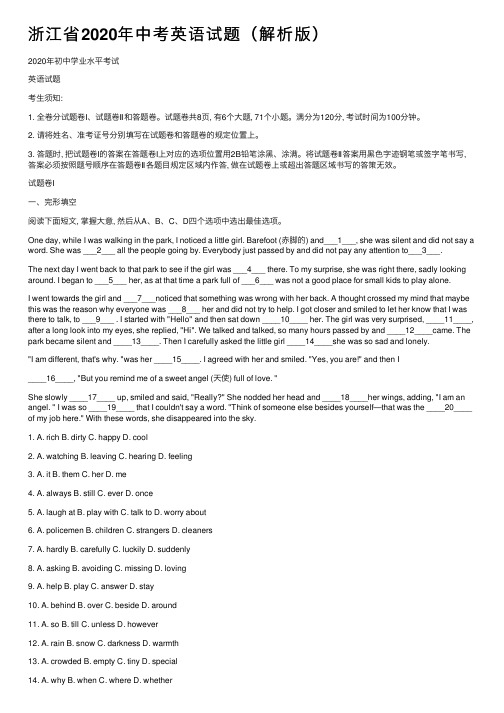
浙江省2020年中考英语试题(解析版)2020年初中学业⽔平考试英语试题考⽣须知:1. 全卷分试题卷I、试题卷Ⅱ和答题卷。
试题卷共8页, 有6个⼤题, 71个⼩题。
满分为120分, 考试时间为100分钟。
2. 请将姓名、准考证号分别填写在试题卷和答题卷的规定位置上。
3. 答题时, 把试题卷I的答案在答题卷I上对应的选项位置⽤2B铅笔涂⿊、涂满。
将试题卷Ⅱ答案⽤⿊⾊字迹钢笔或签字笔书写,答案必须按照题号顺序在答题卷Ⅱ各题⽬规定区域内作答, 做在试题卷上或超出答题区域书写的答策⽆效。
试题卷I⼀、完形填空阅读下⾯短⽂, 掌握⼤意, 然后从A、B、C、D四个选项中选出最佳选项。
One day, while I was walking in the park, I noticed a little girl. Barefoot (⾚脚的) and___1___, she was silent and did not say a word. She was ___2___ all the people going by. Everybody just passed by and did not pay any attention to___3___.The next day I went back to that park to see if the girl was ___4___ there. To my surprise, she was right there, sadly looking around. I began to ___5___ her, as at that time a park full of ___6___ was not a good place for small kids to play alone.I went towards the girl and ___7___noticed that something was wrong with her back. A thought crossed my mind that maybe this was the reason why everyone was ___8___ her and did not try to help. I got closer and smiled to let her know that I was there to talk, to ___9___ . I started with "Hello" and then sat down ____10____ her. The girl was very surprised, ____11____, after a long look into my eyes, she replied, "Hi". We talked and talked, so many hours passed by and ____12____came. The park became silent and ____13____. Then I carefully asked the little girl ____14____she was so sad and lonely."I am different, that's why. "was her ____15____. I agreed with her and smiled. "Yes, you are!" and then I____16____, "But you remind me of a sweet angel (天使) full of love. "She slowly ____17____ up, smiled and said, "Really?" She nodded her head and ____18____her wings, adding, "I am an angel. " I was so ____19____ that I couldn't say a word. "Think of someone else besides yourself—that was the ____20____ of my job here." With these words, she disappeared into the sky.1. A. rich B. dirty C. happy D. cool2. A. watching B. leaving C. hearing D. feeling3. A. it B. them C. her D. me4. A. always B. still C. ever D. once5. A. laugh at B. play with C. talk to D. worry about6. A. policemen B. children C. strangers D. cleaners7. A. hardly B. carefully C. luckily D. suddenly8. A. asking B. avoiding C. missing D. loving9. A. help B. play C. answer D. stay10. A. behind B. over C. beside D. around11. A. so B. till C. unless D. however12. A. rain B. snow C. darkness D. warmth13. A. crowded B. empty C. tiny D. special14. A. why B. when C. where D. whether15. A. advice B. reply C. praise D. excuse16. A. continued B. cried C. waved D. sang17. A. woke B. stood C. gave D. put18. A. spread B. pushed C. beat D. folded19. A. bored B. relaxed C. amazed D. interested20. A. resolution B. difficulty C. dream D. purpose【答案】1. B 2. A 3. C 4. B 5. D 6. C 7. D 8. B 9. A 10. C 11. D 12. C 13. B 14. A 15. B 16. A 17. B 18. A 19. C 20. D【解析】本⽂讲述了作者在公园⾥看到⼀个孤单并且悲伤的⼩⼥孩,作者上前想帮助这个⼩⼥孩,没想到最后⼩⼥孩告诉他,其实她是⼀个天使。
2020年中考英语作文复习---环保主题作文范文
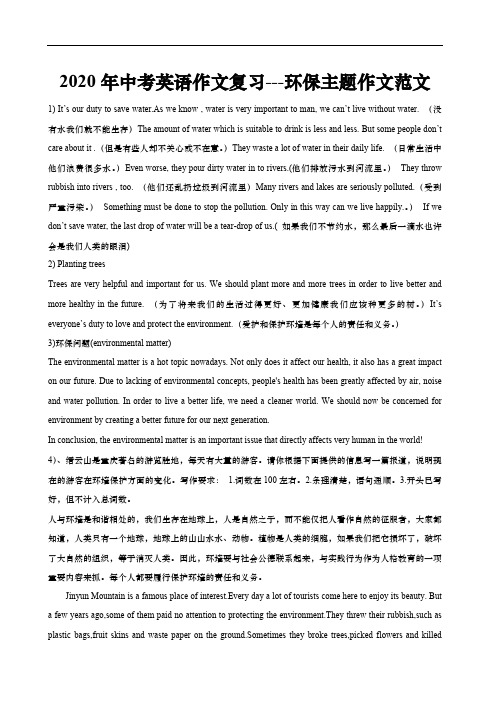
2020年中考英语作文复习---环保主题作文范文1) It’s our duty to save water.As we know , water is very important to man, we can’t live without water. (没有水我们就不能生存)The amount of water which is suitable to drink is less and less. But some people don’t care about it .(但是有些人却不关心或不在意。
)They waste a lot of water in their daily life. (日常生活中他们浪费很多水。
)Even worse, they pour dirty water in to rivers.(他们排放污水到河流里。
)They throw rubbish into rivers , too. (他们还乱扔垃圾到河流里)Many rivers and lakes are seriously polluted.(受到严重污染。
)Something must be done to stop the pollution. Only in this way can we live happily.。
)If we don’t save water, the last drop of water will be a tear-drop of us.( 如果我们不节约水,那么最后一滴水也许会是我们人类的眼泪)2) Planting treesTrees are very helpful and important for us. We should plant more and more trees in order to live better and more healthy in the future. (为了将来我们的生活过得更好、更加健康我们应该种更多的树。
浙江省2020年中考英语试题(原卷版)

So far, Lee and his team have successfully____15____over 150,000 kilograms of food, serving almost 300,000____16____to people who need them. Lee has shown that a____17____action can help people around us greatly.____18____may have a greater influence than we imagine. When Lee is asked_____19_____his next plan is, he says there's still a lot to do. "It's just the____20____. With more restaurants, who knows how much more we can do."
2020年浙江省初中毕业生学业水平考试英语试题卷
2020年浙江省杭州市中考英语试卷及答案解析.pdf

3.What did Betty99 upcycle to make dog toys?
A.Paper boxes.
B.Shopping bags. C.T-shirts.
D.Socks.
Traffic lights are red, yellow and green. They are very important signals (信号). Traffic lights are usually placed at busy street corners to help control traffic. Sometimes, they are on streets near schools and shops, too. Most young children are taught what each of the colored lights means, so everybody can stay safe.
1.What is spBiblioteka cial about the hat?
试卷第 2 页,总 12 页
A.It came from an old sweater.
B.It was given by Gina's mum.
C.It was new and expensive.
D.It was a gift from Gina's sister.
浙江省杭州市 2020 年中考英语试题
学校:___________姓名:___________班级:___________考号:___________
Do you believe in green living? Read the following blog (博客)and replies about a fun, easy and creative way to make your lifestyle greener.
浙江专版2020年中考英语复习方案分类默写六学校学习文化科学爱好试题

分类默写(六) 学校、学习、文化、科学、爱好1.学校设施(n.)学校(n.)学院(n.)大学(n.)年级;成绩(n.)黑板(n.)实验室(n.)办公室(n.)操场2.物品(n.)书包(n.)蜡笔;颜色笔(n.)橡皮(n.)橡胶;橡皮擦(n.)页(n.)尺子(n.)墨水(n.)地图(n.&vt.)便条;笔记;注释(n.)笔记本(n.)字典(n.)纸(n.)座位(n.)铃;钟(n.)粉笔(n.)旗(n.)闪光灯3.读物(n.)艺术(n.)戏剧(n.)诗(n.)故事;小说(n.)意见;评论(n.)主题(n.)品质;角色(n.)文本(n.)文件(n.)新闻(n.)报纸(n.)杂志(n.)(文章等的)一节;一段(n.)表格;形式;结构(n.)笑话(n.)日报(adj.)每日的(n.)抄本(n.)漫画(n.)话题(n.)符号;标志;象征4.学科(n.)学科(n.)英语(n.)语文(n.)数学(n.)科学(n.)美术(n.)音乐(n.)体育(n.)物理(n.)化学(adj.)初级的;初等的(adj.)中级的5.问题(n.)问题(vt.)询问(v.&n.)回答;回复(n.)答案;钥匙(n.)回答;答复(v.)询问(n.)问题;难题(n.)问题;麻烦6.学习内容(n.)知识(n.)家庭作业(n.)课题;作业;项目(n.)功课;教训(n.)文本;课文(n.)单元(n.)句子(v.)发音(n.)发音(n.)语言(n.)文件;公文(n.)技能;技巧(n.)字母;信(n.)单词(n.)词语;表达(n.)材料(n.)目标;物体;宾语7.学习过程(v.)教(v.)学;学会(n.)方法;办法(v.)解释;说明(n.)实验(n.)研究(n.)练习(v.)练习;实践(v.)纠正;改正(adj.)正确的;恰当的(n.)注意;关心(v.)解决;解答(难题等)(n.)错误(v.)弄错(v.)明白;理解;懂得(v.)表达(v.)翻译(n.)过程;课程(v.)培训(n.)训练(v.)创造(n.)调查(n.)任务(n.)进步;进展(n.)意义;意思(v.)标记(n.&v.)规定;统治(n.)学期;术语(n.)组;群8.学习评估(n.)考试;测试;检查;审查(vt.&n.)测试;考查;试验(n.)水平(n.&adj.)标准;标准的(n.)成绩(n.)结果;效果(n.)比赛;竞赛(n.)奖品;奖金(v.)授予;给予奖(金)(n.)演讲(vt.)讨论(v.)失败;不及格;衰退(v.)失去;失败(vt.)通过(vt.)改进;更新(n.&v.)回答;答复(v.)重复(vt.)校对;核对;检查;批改9.历史文化(adj.)社会的(n.)社会;群体(adj.)古代的;古老的(n.)祖先(v.)传播;延伸(n.)文化(n.)习俗;习惯;传统(n.)战争10.科学技术(vt.)创造;发明(n.)发明;创造(n.)机器(n.)科技;技术(n.)科学(adj.)科学的(adj.)电子的11.兴趣爱好(vt.)喜欢;喜爱(vt.)欣赏;享受……的乐趣;喜欢(n.)爱(vt.)热爱;很喜欢(v.)更喜欢(=like…better)(v.)使……满意(adj.)喜爱的(n.)特别喜爱的人或物(v.)关心;在乎(vt.&n.)恨;讨厌(n.)业余爱好;嗜好(n.)兴趣;趣味(n.)(电影、运动等的)迷;爱好者【参考答案】1.学校设施school (n.)学校college (n.)学院university (n.)大学grade (n.)年级;成绩blackboard (n.)黑板lab=laboratory (n.)实验室office (n.)办公室playground (n.)操场2.物品schoolbag (n.)书包crayon (n.)蜡笔;颜色笔eraser (n.)橡皮rubber (n.)橡胶;橡皮擦page (n.)页ruler (n.)尺子ink (n.)墨水map (n.)地图note (n.&vt.)便条;笔记;注释notebook (n.)笔记本dictionary (n.)字典paper (n.)纸seat (n.)座位bell (n.)铃;钟chalk (n.)粉笔flag (n.)旗flash (n.)闪光灯3.读物article (n.)文章art (n.)艺术play (n.)戏剧poem (n.)诗story (n.)故事;小说comment (n.)意见;评论theme (n.)主题character (n.)品质;角色text (n.)文本document (n.)文件news (n.)新闻newspaper (n.)报纸magazine (n.)杂志passage (n.)(文章等的)一节;一段form (n.)表格;形式;结构joke (n.)笑话daily (n.)日报(adj.)每日的copy (n.)抄本cartoon (n.)漫画topic (n.)话题symbol (n.)符号;标志;象征4.学科subject (n.)学科English (n.)英语Chinese (n.)语文maths(美math) (n.)数学science (n.)科学art (n.)美术music (n.)音乐PE (n.)体育history (n.)历史geography (n.)地理physics (n.)物理chemistry (n.)化学primary (adj.)初级的;初等的middle (adj.)中级的5.问题question (n.)问题(vt.)询问answer (v.&n.)回答;回复key (n.)答案;钥匙reply (n.)回答;答复ask (v.)询问problem (n.)问题;难题trouble (n.)问题;麻烦6.学习内容knowledge (n.)知识homework (n.)家庭作业project (n.)课题;作业;项目lesson (n.)功课;教训text (n.)文本;课文unit (n.)单元sentence (n.)句子pronounce (v.)发音pronunciation (n.)发音language (n.)语言document (n.)文件;公文skill (n.)技能;技巧letter (n.)字母;信word (n.)单词expression (n.)词语;表达material (n.)材料grammar (n.)语法composition (n.)作文object (n.)目标;物体;宾语7.学习过程teach (v.)教learn (v.)学;学会method (n.)方法;办法explain (v.)解释;说明experiment (n.)实验research (n.)研究practice (n.)练习practise (美practice) (v.)练习;实践correct (v.)纠正;改正(adj.)正确的;恰当的attention (n.)注意;关心solve (v.)解决;解答(难题等)mistake (n.)错误(v.)弄错understand (v.)明白;理解;懂得express (v.)表达translate (v.)翻译course (n.)过程;课程train (v.)培训training (n.)训练create (v.)创造survey (n.)调查task (n.)任务progress (n.)进步;进展meaning (n.)意义;意思mark (v.)标记rule (n.&v.)规定;统治term (n.)学期;术语group (n.)组;群team (n.)队line (n.)排;行8.学习评估exam=examination (n.)考试;测试;检查;审查test (vt.&n.)测试;考查;试验level (n.)水平standard (n.&adj.)标准;标准的score (n.)成绩result (n.)结果;效果competition (n.)比赛;竞赛prize (n.)奖品;奖金award (v.)授予;给予奖(金)speech (n.)演讲discuss (vt.)讨论fail (v.)失败;不及格;衰退lose (v.)失去;失败pass (vt.)通过improve (vt.)改进;更新reply (n.&v.)回答;答复repeat (v.)重复check (vt.)校对;核对;检查;批改9.历史文化social (adj.)社会的society (n.)社会;群体ancient (adj.)古代的;古老的ancestor (n.)祖先spread (v.)传播;延伸culture (n.)文化custom (n.)习俗;习惯;传统war (n.)战争10.科学技术invent (vt.)创造;发明invention (n.)发明;创造machine (n.)机器technology (n.)科技;技术science (n.)科学scientific (adj.)科学的electronic (adj.)电子的11.兴趣爱好like (vt.)喜欢;喜爱enjoy (vt.)欣赏;享受……的乐趣;喜欢love (n.)爱(vt.)热爱;很喜欢prefer (v.)更喜欢(=like…better)satisfy (v.)使……满意favourite (美favorite) (adj.)喜爱的(n.)特别喜爱的人或物care (v.)关心;在乎hate (vt.&n.)恨;讨厌hobby (n.)业余爱好;嗜好interest (n.)兴趣;趣味fan (n.)(电影、运动等的)迷;爱好者。
浙江省杭州市2020年毕业考试中考英语试题含答案

杭州市2020年初中学业水平考试英语试题第I卷第一部分听力(共两节, 满分30分)第一节(共5小题, 每小题2分, 满分10分)听下面5段对话。
每段对话后有一个小题。
从题中所给的A、B、C三个选项中选出最佳选项, 并标在试卷的相应位置。
听完每段对话后, 你都有10秒钟的时间来回答有关小题和阅读下一小题。
每段对话仅读一遍。
1. Where does the woman want to go?4. A bus stop. B. Long Street. C. The Art Museum.2. Who will the woman meet tonight?A. James Bond.B. Tom.C. Ella.3. What time is it now?A. 2∶00B. 9∶00.C. 11∶00.4. Where does the conversation probably take place?A. At a clothes shop.B. At a restaurant.C. At a bank.5. What does the woman mean?A. They can eat now.B. They have to wait.C. They arrive late.第二节(共10小题, 每小题2分, 满分20分)听下面3段对话或独白。
每段对话或独白后有几个小题, 从题中所给的A、B、C三个选项中选出最佳选项, 并标在试卷的相应位置。
听每段对话或独白前, 你有时间阅读各小题, 每小题5秒钟。
听完后, 各小题将给出5秒钟的作答时间。
每段对话或独白读两遍。
听下面一段对话, 回答第6至第8三个小题。
6. What are the two speakers talking about?A. A weekend plan.B. A travel plan.C. A business plan.7. What is the man going to do on Saturday afternoon?A. Go to the library.B. Finish the science project.C. Go to a bike ride.8. When will the speakers meet?A. On Saturday evening.B. On Sunday morning.C. On Sunday afternoon.听下面一段对话, 回答第9至第11三个小题。
2020年浙江中考英语真题分类汇编 专题 语法填空 (教师版)

专题语法填空目录一、浙江杭州阅读下面材料,在空白处填入适当的内容(1个单词)或括号内单词的正确形式。
将答案填写在答题纸的相应位置。
Simon Dale didn’t want to live in a city’s apartment building. So he made up his mind 1 (build) his own home in the countryside. He moved to Wales with his family and built a wooden eco-house. With the help of his father-in-law, a builder, he moved into a 2 (comfort) new home after only four months. 3 only cost $4,700 to build the house.The eco-house is made of natural 4 (material). Simon Dale and his father-in-law 5 (dig) into the side of a hill and then used the mud and stone to make the walls. The floors 6 (make) from wood from the nearby area. The design is open-plan. There is no central heating, 7 th ere’s a wood-burner and solar panels (太阳能电板) on the top 8 can provide power for lighting, music and computing. Drinking water is from a nearby spring. The fridge stays cool, thanks 9 air from under the ground. Simon Dale says, “We try to live in pe ace with the natural world.” He has 10 (certain) done his best to achieve that.【答案】 to build;comfortable;It;materials;dug;are made;but;which /that;to;certainly 【解析】文章大意:文章讲述了Simon Dale的生态房子。
2020中考英语复习方案完形填空02环境保护篇试题

完形填空(二) 环境保护篇【A组】Ⅰ.[2019·连云港]阅读下面短文,从A、B、C、D四个选项中选出最佳选项。
A zero-waste life is a lifestyle that hardly creates any rubbish. So, a zero-waste theme store is about 1 people with a number of everyday, practical and pleasant zero-waste products to help them start on a one-stop, zero-waste life journey.“Zero waste” or “danshari” was first 2 by a French woman Bea Johnson. “Live a life and try not to create any rubbish; use different methods to protect the earth,” she said.Yu Yuan, 27, is 3 attracted by this idea.She and her boyfriend have lived in Beijing for many years. And earlier she used to be a customer without thinking a lot 4 she saw a video about “zero waste”.The 5 is about a family of four, and the rubbish they produce every year is placed in a jar.After watching the video, Yu wanted to 6 this zero-waste lifestyle with her boyfriend.Yu says that a zero-waste life 7 the 6R principle—Refuse, Reduce, Reuse, Repair, Recycle and Rot(腐烂).Over August—October when Yu followed the principle of zero-waste 6R, she and her boyfriend Joe Harvey both 8 only two cans of rubbish.Now, the couple have opened a small 9 called The Bulk House in Nanluoguxiang, Beijing, to support a zero-waste life.At the store they use environmentally friendly products. For example, they use wood products to replace 10 ones and prepare cloth bags printed with zero-waste logos for customers. Most of the products sold in the store can be reused, and a small number of 11 which are not recyclable can degrade(分解).The store 12 has secondhand books and audio-visual CD/DVDs.For used toiletries (things like soap and toothpaste that are used for cleaning yourself) there is a company which accepts them, and the couple regularly mails their waste to it.Yu says that those who were once not 13 in the zero-waste lifestyle have gradually changed because of curiosity. The zero-waste lifestyle, she adds, is for everyone.“It's14 us at ou r fingertips.” Yu expects some of her friends to15 her on the road to zero waste. As the saying goes, many hands make light work.( )1.A.offering B.providing C.giving D.affording( )2.A.invented B.found C.discovered D.suggested( )3.A.hardly B.luckily C.clearly D.deeply( )4.A.unless B.until C.after D.when( )5.A.video B.film C.article D.newspaper( )6.A.experience B.change C.represent D.spend( )7.A.accepts B.receives C.follows D.believes( )8.A.saved B.produced C.kept D.wasted( )9.A.shop B.factory C.hotel pany( )10.A.paper B.cloth C.silk D.plastic( )11.A.it B.them C.their D.its( )12.A.too B.either C.also D.only( )13.A.proud B.worried C.amazed D.interested( )14.A.behind B.around C.ahead D.above( )anize B.record C.join D.encourageⅡ.阅读下面短文,用方框中所给词的适当形式填空。
浙江省2020年中考英语试题(原卷版)
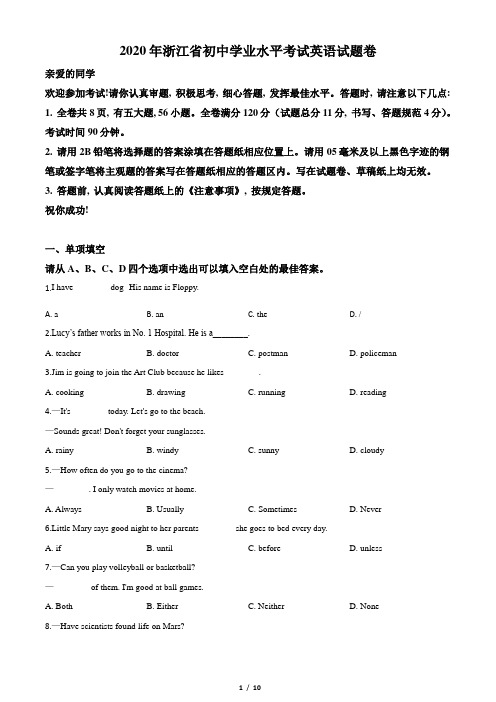
2020年浙江省初中学业水平考试英语试题卷亲爱的同学欢迎参加考试!请你认真审题, 积极思考, 细心答题, 发挥最佳水平。
答题时, 请注意以下几点: 1. 全卷共8页, 有五大题, 56小题。
全卷满分120分(试题总分11分, 书写、答题规范4分)。
考试时间90分钟。
2. 请用2B铅笔将选择题的答案涂填在答题纸相应位置上。
请用05毫米及以上黑色字迹的钢笔或签字笔将主观题的答案写在答题纸相应的答题区内。
写在试题卷、草稿纸上均无效。
3. 答题前, 认真阅读答题纸上的《注意事项》, 按规定答题。
祝你成功!一、单项填空请从A、B、C、D四个选项中选出可以填入空白处的最佳答案。
1.I have________ dog.His name is Floppy. A. a B. an C. the D. / 2.Lucy’s father works in No. 1 Hospital. He is a________.A. teacher B. doctor C. postman D. policeman 3.Jim is going to join the Art Club because he likes________. A. cooking B. drawing C. running D. reading 4.—It's ________today. Let's go to the beach. —Sounds great! Don't forget your sunglasses. A. rainy B. windy C. sunny D. cloudy 5.—How often do you go to the cinema? —________. I only watch movies at home. A. Always B. Usually C. Sometimes D. Never 6.Little Mary says good night to her parents________ she goes to bed every day. A. if B. until C. before D. unless 7.—Can you play volleyball or basketball? —________ of them. I'm good at ball games. A. Both B. Either C. Neither D. None 8.—Have scientists found life on Mars?—Not yet, but I think they ________it some day.A. findB. foundC. have foundD. will find9.—Do you know ________?—In Stratford, England.A. where Shakespeare was bornB. when Shakespeare finished schoolC. how many plays Shakespeare wroteD. why Shakespeare's works are popular10.—The Great Wall runs about 21, 200 kilometres.—Wow! ________.A. It's OKB. Good ideaC. That's amazingD. You are welcome二、完形填空阅读下面短文, 掌握大意, 然后从每小题所给的A、B、C、D四个选项中选出最佳选项。
浙江省2020年中考英语试题(解析版)
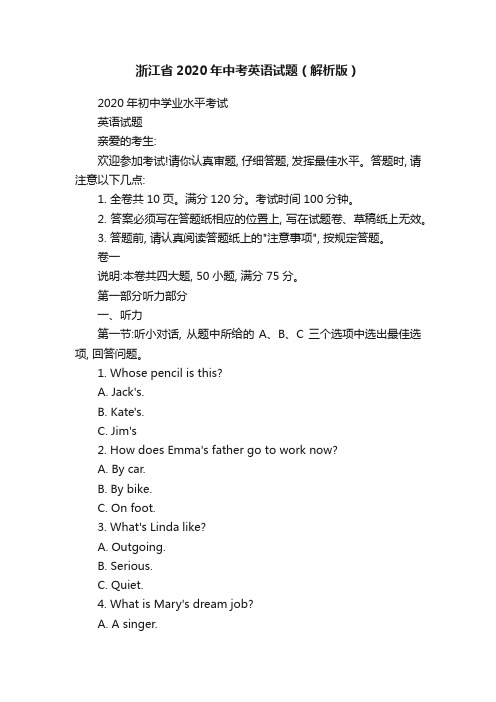
浙江省2020年中考英语试题(解析版)2020年初中学业水平考试英语试题亲爱的考生:欢迎参加考试!请你认真审题, 仔细答题, 发挥最佳水平。
答题时, 请注意以下几点:1. 全卷共10页。
满分120分。
考试时间100分钟。
2. 答案必须写在答题纸相应的位置上, 写在试题卷、草稿纸上无效。
3. 答题前, 请认真阅读答题纸上的"注意事项", 按规定答题。
卷一说明:本卷共四大题, 50小题, 满分75分。
第一部分听力部分一、听力第一节:听小对话, 从题中所给的A、B、C三个选项中选出最佳选项, 回答问题。
1. Whose pencil is this?A. Jack's.B. Kate's.C. Jim's2. How does Emma's father go to work now?A. By car.B. By bike.C. On foot.3. What's Linda like?A. Outgoing.B. Serious.C. Quiet.4. What is Mary's dream job?A. A singer.B. A dancer.C. An actress.5. What are the speakers mainly talking about?A. A photo.B. A friend.C. A holiday.第二节:听较长对话, 从题中所给的A、B、C三个选项中选出最佳选项, 回答问题。
听下面一段较长对话, 回答第6~7两个小题。
6. What was wrong with Peter?A. A bus hit him.B. He fell off his bike.C. His leg was broken.7. How long does Peter have to stay in hospital?A. For a few days.B. For a few weeks.C. For a few months.听下面一段较长对话, 回答第8~10三个小题。
浙江专版2020中考英语复习:分类默写13份(付,125)
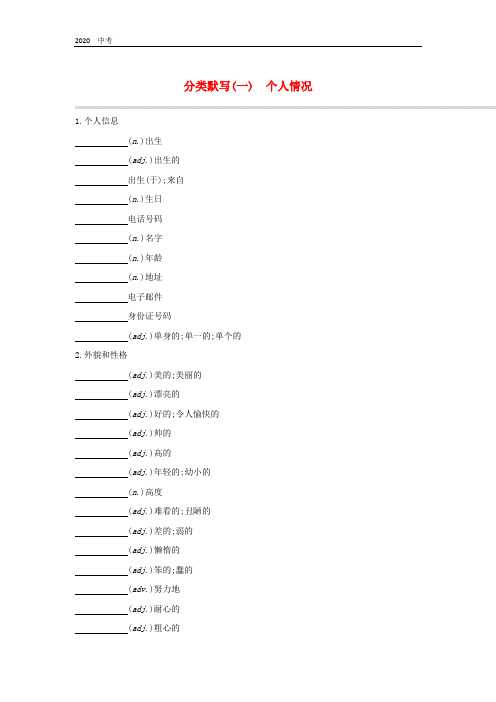
分类默写(一) 个人情况1.个人信息(n.)出生(adj.)出生的出生(于);来自(n.)生日电话号码(n.)名字(n.)年龄(n.)地址电子邮件身份证号码(adj.)单身的;单一的;单个的2.外貌和性格(adj.)美的;美丽的(adj.)漂亮的(adj.)好的;令人愉快的(adj.)帅的(adj.)高的(adj.)年轻的;幼小的(n.)高度(adj.)难看的;丑陋的(adj.)差的;弱的(adj.)懒惰的(adj.)笨的;蠢的(adv.)努力地(adj.)耐心的(adj.)粗心的(adj.)小心的;仔细的;谨慎的(adj.)礼貌的(adj.)粗鲁的(adj.)严肃的;认真的(adj.)严格的;严厉的(adj.)幽默的(adj.)友好的(adj.)可爱的;亲切的(adj.)害羞的(adj.)强壮的;坚固的;强烈的;坚强的(adj.)积极的(adj.)勇敢的(adj.)不诚实的(adj.)诚实的(adj.)精力充沛的;充满活力的(adj.)活泼的;充满生气的(adj.)美好的;可爱的(adj.)安静的(adj.)善良的(adj.)有帮助的(adj.)卓越的;极好的(adj.)可爱的;聪明的(adj.)睿智的(adj.)聪明的;明亮的(adj.)聪明的(adj.)漂亮的;时髦的;聪明的(adj.)创造性的(adj.)傻里傻气的(adj.)热情的(adj.)善良的(n.)种类3.工作、职业与身份(n.)公务员;官员;军官(n.)统治者(n.)领袖;领导人(n.)总统;主席(n.)国王(n.)王后;女王(n.)秘书(n.)演讲人;演说家(n.)医生(n.)护士(n.)牙医(n.)病人(n.)农民(n.)老板;雇主(n.)工人(n.)经理(n.)全体职员(n.)士兵;战士(n.)敌人(n.)警察;警察部门(n.)男警察(n.)女警察(n.)卫兵;警卫(n.)邮递员(n.)记者(n.)摄影师(n.)听者(n.)(男)演员(n.)女演员(n.)演奏者(n.)指导者;导演(n.)作家(n.)歌手(n.)教师(n.)学生(n.)同班同学(n.)班长(n.)小学生(n.)(13至19岁的)青少年(n.)司机(n.)飞行员(n.)船长;队长;(海军)上校(n.)乘客(n.)物主;所有人(n.)音乐家(n.)男服务员(n.)女服务员(n.)工程师(n.)科学家(n.)旅行者;观光者(n.)艺术家【参考答案】1.个人信息birth (n.)出生born (adj.)出生的be from出生(于);来自birthday (n.)生日telephone number电话号码name (n.)名字age (n.)年龄address (n.)地址email电子邮件ID number身份证号码single (adj.)单身的;单一的;单个的2.外貌和性格beautiful (adj.)美的;美丽的pretty (adj.)漂亮的nice (adj.)好的;令人愉快的handsome (adj.)帅的tall (adj.)高的young (adj.)年轻的;幼小的height (n.)高度ugly (adj.)难看的;丑陋的weak (adj.)差的;弱的lazy (adj.)懒惰的stupid (adj.)笨的;蠢的hard (adv.)努力地patient (adj.)耐心的careless (adj.)粗心的careful (adj.)小心的;仔细的;谨慎的polite (adj.)礼貌的rude (adj.)粗鲁的serious (adj.)严肃的;认真的strict (adj.)严格的;严厉的humorous (adj.)幽默的friendly (adj.)友好的sweet (adj.)可爱的;亲切的shy (adj.)害羞的strong (adj.)强壮的;坚固的;强烈的;坚强的active (adj.)积极的brave (adj.)勇敢的dishonest (adj.)不诚实的honest (adj.)诚实的energetic (adj.)精力充沛的;充满活力的lively (adj.)活泼的;充满生气的lovely (adj.)美好的;可爱的quiet (adj.)安静的kind (adj.)善良的helpful (adj.)有帮助的excellent (adj.)卓越的;极好的cute (adj.)可爱的;聪明的wise (adj.)睿智的bright (adj.)聪明的;明亮的clever (adj.)聪明的smart (adj.)漂亮的;时髦的;聪明的creative (adj.)创造性的silly (adj.)傻里傻气的warm (adj.)热情的kind (adj.)善良的(n.)种类3.工作、职业与身份officer (n.)公务员;官员;军官ruler (n.)统治者leader (n.)领袖;领导人president (n.)总统;主席king (n.)国王queen (n.)王后;女王secretary (n.)秘书speaker (n.)演讲人;演说家doctor (n.)医生nurse (n.)护士dentist (n.)牙医patient (n.)病人farmer (n.)农民boss (n.)老板;雇主worker (n.)工人manager (n.)经理staff (n.)全体职员soldier (n.)士兵;战士enemy (n.)敌人police (n.)警察;警察部门policeman (n.)男警察policewoman (n.)女警察guard (n.)卫兵;警卫postman (n.)邮递员reporter (n.)记者photographer (n.)摄影师listener (n.)听者actor (n.)(男)演员actress (n.)女演员player (n.)演奏者director (n.)指导者;导演writer (n.)作家singer (n.)歌手teacher (n.)教师student (n.)学生classmate (n.)同班同学monitor (n.)班长pupil (n.)小学生teenager (n.)(13至19岁的)青少年driver (n.)司机pilot (n.)飞行员captain (n.)船长;队长;(海军)上校passenger (n.)乘客owner (n.)物主;所有人musician (n.)音乐家waiter (n.)男服务员waitress (n.)女服务员engineer (n.)工程师scientist (n.)科学家traveller (n.)旅行者;观光者artist (n.)艺术家分类默写(二) 家庭、朋友和周围的人1.家人与亲友(n.)家庭;子女(n.)亲属;亲戚(n.)关系(n.)夫妻(n.)父亲;母亲(n.)(外)祖父;(外)祖母(n.)(外)祖父(n.)(外)祖母(n.)(外)孙子;(外)孙女;孙辈(n.)(外)孙女(n.)父亲(n.)(口语)爸爸;爹爹(n.)母亲(n.)妈妈(n.)叔;伯;舅;姑父;姨父(n.)伯母;舅母;婶;姑;姨(n.)兄;弟(n.)姐;妹(n.)儿子(n.)女儿(n.)堂(表)兄、弟;堂(表)姐、妹(n.)妻子(n.)丈夫(n.)朋友2.其他人(n.)人类(n.)人们;人(n.)(单数)人(n.)绅士;男士(n.)陌生人(n.)英雄(n.)先锋;先驱(n.)邻居;邻人(n.)某街区(或城区)的居民(n.)孩子;儿童(n.)妇女(n.)成年男人;人;人类(n.)女孩(n.)男孩(n.)小孩(n.)婴儿(n.)长辈;前辈(n.)女士(n.)小姐;女士(n.)客人;宾客(n.)成员;会员(n.)家伙;伙计【参考答案】1.家人与亲友family (n.)家庭;子女relative (n.)亲属;亲戚relationship (n.)关系couple (n.)夫妻parent (n.)父亲;母亲grandparent (n.)(外)祖父;(外)祖母grandpa=grandfather (n.)(外)祖父grandma=grandmother (n.)(外)祖母grandchild (n.)(外)孙子;(外)孙女;孙辈granddaughter (n.)(外)孙女father (n.)父亲dad=daddy (n.)(口语)爸爸;爹爹mother (n.)母亲mum(美mom) (n.)妈妈uncle (n.)叔;伯;舅;姑父;姨父aunt (n.)伯母;舅母;婶;姑;姨brother (n.)兄;弟sister (n.)姐;妹son (n.)儿子daughter (n.)女儿cousin (n.)堂(表)兄、弟;堂(表)姐、妹wife (n.)妻子husband (n.)丈夫friend (n.)朋友2.其他人human (n.)人类people (n.)人们;人person (n.)(单数)人gentleman (n.)绅士;男士stranger (n.)陌生人hero (n.)英雄pioneer (n.)先锋;先驱neighbour(美neighbor) (n.)邻居;邻人neighbourhood (美neighborhood)(n.)某街区(或城区)的居民child (n.)孩子;儿童woman (n.)妇女man (n.)成年男人;人;人类girl (n.)女孩boy (n.)男孩kid (n.)小孩baby (n.)婴儿elder (n.)长辈;前辈lady (n.)女士Miss (n.)小姐;女士guest (n.)客人;宾客member (n.)成员;会员guy (n.)家伙;伙计分类默写(三) 周围环境1.政府、教育、医疗(n.)政府(n.)公文;文件(n.)委员会;(政府的)部(n.)组织(v.)把……组织起来;组织(n.)布告;通告(v.)教育;培养(n.)教育;培养(adj.)医学的;医疗的(n.)治疗;疗法(v.)动手术(n.)手术(n.)药(n.)军队(n.)法律(n.)权利(n.)法令;条例(n.)枪2.农业、工业、商业周边(n.)农村地区;乡下(adj.)地方的;当地的(n.)村庄;乡村(n.)农场;农庄(n.)农田;牧场;场地(n.)生意;交易;事业(n.)工业(n.)公司(n.)市场;集市(n.)超级市场(n.)工厂(n.)装备;设备(n.)记号;标记;招牌;符号(v.)设法做到;管理(vt.)生产;制造(n.)产物;产品(n.)说明;须知(n.)会议3.房屋周边(n.)家(adv.)回家(n.)家乡(n.)房子(n.)公寓(n.)地址(n.)院子;码(n.)门(n.)窗户(n.)玻璃(n.)大门(n.)地板;地面(n.)花园(n.)走廊(n.)楼梯(n.)庭院(n.)墙(n.)浴室;卫生间(n.)卧室(n.)厨房(n.)书房4.城市设施(n.)城镇(n.)建筑物;大楼(n.)社区(n.)街区(n.)角落(n.)桥(n.)教堂(n.)体育馆(n.)画廊(n.)公司(n.)医院(n.)厕所(n.)旅馆邮局(n.)图书馆(n.)电影院(n.)剧场;戏院(n.)(剧院、电影院的)一排座位(n.)俱乐部(n.)饭馆;饭店(n.)大厅;礼堂(n.)广场(n.)商店(n.)塔(n.)法庭;球场(n.)宫殿5.生活用品(n.)手提包(n.)钱包(n.&v.)锁(n.)钥匙(n.)绳索;路线(n.)篮子(n.)电池(n.)照相机(n.)火(n.)蜡烛(n.)肥皂(n.)刷;刷子(n.)太阳镜(n.)手表(n.)钟(n.)工具(n.)名片;纸牌(n.)邮票(n.)香烟(n.)日记;日记簿(n.)日历;日历书(n.)玩偶(n.)玩具(n.)剪刀(n.)雨伞(n.)火柴(n.)警报器(n.)网(n.)绳子(n.)照片(n.)保险箱(n.& v.)圆圈;画圆圈;环绕(n.)冰箱(n.)记录;唱片(n.)录音机(n.)电话(n.)录像;视频(n.)风扇(n.)图片;照片(n.)风筝(n.)收音机(n.)磁带(n.)因特网(n.)键盘(n.)菜单(n.)屏幕(n.)电脑6.天气(n.)天气(adj.)晴朗的(adj.)多云的(n.)风(adj.)有风的;多风的(v.)下雪(n.)雪(adj.)下雪的;多雪的(v.)下雨(n.)雨水(adj.)下雨的;多雨的(adj.)干的;干燥的(adj.)湿的;潮湿的(adj.)冷的;寒冷的(adj.)热的(adj.)暖和的;温暖的(adj.)凉的;凉爽的(v.)(云、烟等)消散(n.)阳光(v.)发光;照耀(n.)阵雨(n.)风暴;暴风雨(n.)零度(n.)温度(n.)度;度数(温度单位)(n.)热;温度7.节假日(n.)节日(adj.)传统的(v.)度过(n.)情景;风景(n.)观光;游览(n.)假日;假期(n.)假期;休假(n.)圣诞节(n.)礼物;恩赐【参考答案】1.政府、教育、医疗government (n.)政府document (n.)公文;文件board (n.)委员会;(政府的)部organisation(美organization) (n.)组织organise (v.)把……组织起来;组织notice (n.)布告;通告educate (v.)教育;培养education (n.)教育;培养medical (adj.)医学的;医疗的treatment (n.)治疗;疗法operate (v.)动手术operation (n.)手术medicine (n.)药army (n.)军队law (n.)法律right (n.)权利act (n.)法令;条例gun (n.)枪2.农业、工业、商业周边countryside (n.)农村地区;乡下local (adj.)地方的;当地的village (n.)村庄;乡村farm (n.)农场;农庄field (n.)农田;牧场;场地business (n.)生意;交易;事业industry (n.)工业company (n.)公司market (n.)市场;集市supermarket (n.)超级市场factory (n.)工厂equipment (n.)装备;设备sign (n.)记号;标记;招牌;符号manage (v.)设法做到;管理produce (vt.)生产;制造production (n.)产物;产品instruction (n.)说明;须知meeting (n.)会议robot (n.)机器人3.房屋周边home (n.)家(adv.)回家hometown (n.)家乡house (n.)房子flat (n.)公寓address (n.)地址yard (n.)院子;码door (n.)门window (n.)窗户glass (n.)玻璃gate (n.)大门floor (n.)地板;地面garden (n.)花园gallery (n.)走廊stairs (n.)楼梯court (n.)庭院wall (n.)墙bathroom (n.)浴室;卫生间bedroom (n.)卧室kitchen (n.)厨房study (n.)书房4.城市设施town (n.)城镇building (n.)建筑物;大楼community (n.)社区block (n.)街区corner (n.)角落bridge (n.)桥church (n.)教堂museum (n.)博物馆gym=gymnasium (n.)体育馆gallery (n.)画廊company (n.)公司hospital (n.)医院toilet (n.)厕所hotel (n.)旅馆post office邮局library (n.)图书馆cinema (n.)电影院theatre (美theater)(n.)剧场;戏院row (n.)(剧院、电影院的)一排座位club (n.)俱乐部restaurant (n.)饭馆;饭店hall (n.)大厅;礼堂square (n.)广场store (n.)商店tower (n.)塔court (n.)法庭;球场palace (n.)宫殿5.生活用品handbag (n.)手提包wallet/purse (n.)钱包lock (n.&v.)锁key (n.)钥匙line (n.)绳索;路线basket (n.)篮子camera (n.)照相机electricity (n.)电;电流fire (n.)火candle (n.)蜡烛soap (n.)肥皂brush (n.)刷;刷子sunglasses (n.)太阳镜watch (n.)手表clock (n.)钟tool (n.)工具card (n.)名片;纸牌stamp (n.)邮票cigarette (n.)香烟diary (n.)日记;日记簿calendar (n.)日历;日历书doll (n.)玩偶toy (n.)玩具scissors (n.)剪刀umbrella (n.)雨伞match (n.)火柴alarm (n.)警报器net (n.)网rope (n.)绳子photo (n.)照片safe (n.)保险箱circle (n.&v.)圆圈;画圆圈;环绕fridge=refrigerator (n.)冰箱record (n.)记录;唱片recorder (n.)录音机video (n.)录像;视频fan (n.)风扇picture (n.)图片;照片kite (n.)风筝radio (n.)收音机tape (n.)磁带Internet (n.)因特网keyboard (n.)键盘menu (n.)菜单screen (n.)屏幕computer (n.)电脑6.天气weather (n.)天气sunny (adj.)晴朗的cloudy (adj.)多云的wind (n.)风windy (adj.)有风的;多风的snow (v.)下雪(n.)雪snowy (adj.)下雪的;多雪的rain (v.)下雨(n.)雨水rainy (adj.)下雨的;多雨的dry (adj.)干的;干燥的wet (adj.)湿的;潮湿的cold (adj.)冷的;寒冷的hot (adj.)热的warm (adj.)暖和的;温暖的cool (adj.)凉的;凉爽的lift (v.)(云、烟等)消散sunshine (n.)阳光shine (v.)发光;照耀shower (n.)阵雨storm (n.)风暴;暴风雨zero (n.)零度temperature (n.)温度degree (n.)度;度数(温度单位)heat (n.)热;温度7.节假日festival (n.)节日traditional (adj.)传统的spend (v.)度过sight (n.)情景;风景sightseeing (n.)观光;游览holiday (n.)假日;假期vacation (n.)假期;休假Christmas (n.)圣诞节gift (n.)礼物;恩赐分类默写(四) 时间(点、段、频率)和程度1.时间点和时间段(adv.)点钟(n.)中午(n.)一刻钟(adj.)现在的(conj.)当……的时候(adv.&n.)今天;现在;当前(adv.&n.)明天(adv.&n.)昨天(adv.&n.)今晚(n.)早晨;上午(n.)下午(n.)傍晚;晚上(n.)秒(n.)分钟;一会儿;瞬间(n.)小时(n.)月(n.)年(n.)世纪;百年(n.)将来(n.)阶段;时期(n.)时间;次数(adv.&prep.&conj.)在后来;在……之后(conj.)在……之前;以前(adv.)以前(adv.)后来(adj.)迟的;晚的(adj.)早的(prep.)在……期间(adv.)最近(prep.)自从(prep.)持续一段时间(adv.)不久(prep.&conj.)直到……为止(conj.)在……的时候;和……同时(prep.)到……时间;不迟于(v.)持续(adv.)永远(n.)星期;周(n.)星期二(n.)星期三(n.)星期四(n.)星期五(n.)星期六(n.)星期日(n.)工作日(n.)日期(n.)月份(n.)一月(n.)二月(n.)三月(n.)四月(n.)五月(n.)六月(n.)七月(n.)八月(n.)九月(n.)十月(n.)十一月(n.)十二月2.频率和程度(adv.)绝不;从来没有(adv.)几乎不(adv.)有时(adv.)常常;经常(adv.)通常(adv.)总是;一直;永远(adv.)一次(adj.)每天的(adj.)每一;每个的(adj.)规则的;定期的(adv.)再一次;再;又(adv.)已经(adv.)曾经;无论何时(adv.)仍然;还(adv.)尚;还;仍然(adv.)相当;稍微(adv.)完全;十分(adv.)甚至;连(……都)(adv.)太;过分;很;非常(adv.)恰好;仅(adv.)仅仅;只;才(adv.)如此;这么(adv.)那么【参考答案】1.时间点和时间段o'clock (n.)点钟noon (n.)中午quarter (n.)一刻钟present (adj.)现在的when (conj.)当……的时候today (adv.&n.)今天;现在;当前tomorrow (adv.&n.)明天yesterday (adv.&n.)昨天tonight (adv.&n.)今晚morning (n.)早晨;上午afternoon (n.)下午evening (n.)傍晚;晚上second (n.)秒minute (n.)分钟;一会儿;瞬间hour (n.)小时month (n.)月year (n.)年century (n.)世纪;百年future (n.)将来period (n.)阶段;时期time (n.)时间;次数after (adv.&prep.&conj.)在后来;在……之后before (conj.)在……之前;以前ago (adv.)以前later (adv.)后来late (adj.)迟的;晚的early (adj.)早的during (prep.)在……期间recently (adv.)最近since (prep.)自从for (prep.)持续一段时间soon (adv.)不久until (prep.&conj.)直到……为止while (conj.)在……的时候;和……同时by (prep.)到……时间;不迟于last (v.)持续forever (adv.) 永远week (n.)星期;周Tuesday (n.)星期二Wednesday (n.)星期三Thursday (n.)星期四Friday (n.)星期五Saturday (n.)星期六Sunday (n.)星期日weekday (n.)工作日date (n.)日期month (n.)月份January (n.)一月February (n.)二月March (n.)三月April (n.)四月May (n.)五月June (n.)六月July (n.)七月August (n.)八月September (n.)九月October (n.)十月November (n.)十一月December (n.)十二月2.频率和程度never (adv.)绝不;从来没有hardly (adv.)几乎不sometimes (adv.)有时often (adv.)常常;经常usually (adv.)通常always (adv.)总是;一直;永远twice (adv.)两次daily (adj.)每天的every (adj.)每一;每个的regular (adj.)规则的;定期的again (adv.)再一次;再;又already (adv.)已经ever (adv.)曾经;无论何时still (adv.)仍然;还yet (adv.)尚;还;仍然rather (adv.)相当;稍微quite (adv.)完全;十分even (adv.)甚至;连(……都)too (adv.)太;过分;很;非常just (adv.)恰好;仅only (adv.)仅仅;只;才so (adv.)如此;这么then (adv.)那么分类默写(五) 日常活动1.动作、状态、活动(v.)让(v.)利用;使用(v.)吹(v.)点头(v.)摇晃(v.)观看;注视(v.)注意到(v.)猜(v.)猜想(v.)听(v.)听到(v.)感觉;觉得(v.)发出声音(n.)声音(v.)读(v.)大喊(v.&n.)聊天;闲聊(v.)有……味道;品尝(v.)闻;嗅(v.)吻;亲吻(v.)拉(v.)推(v.)冲;奔(v.)接触;触摸(v.)粘贴;粘合 (n.)胶水(v.)指出(v.)挥舞(v.)举起;抬起(v.)关闭(v.)给(v.)拿;取(v.)敲;打;击(v.)打;击中(v.)捉住(v.)握住(v.)挖;掘(v.)写(v.)打印(v.)拾起;挑选(v.)偷(v.)放(v.)灌;倒(v.)装满(v.)切;剪;削(v.)扔(v.)制造;做(v.)悬挂;吊着(v.)躲藏(v.)站立(v.)关(v.)分开(adj.)分开的(v.)混合;混在一起(v.)放置;产卵(v.)划分;使分离(v.)指挥;导演(adj.)直接的;直达的(v.)控制(v.)准备(adj.)有准备的(v.)考虑(v.)收集(v.)比较(v.)完成(v.)知道;了解(v.)取消(v.)建造(v.)跟随;跟着(v.)休息(v.)迫使(n.)力量;武力(v.)得到;到达;变得(v.)赶快;迅速移动(v.)成为(v.)发生(v.)等候(vi.)继续(v.)同意;应允(v.)接受(vt.)允许;准许(v.)拒绝;不愿(v.)收到;接收(prep.)反对(vt.)救;挽救(adj.)安全的(v.)冒险(vt.)保护(vt.)防止;预防(v.)避免;躲开;逃避(v.)(向别人)借用;借(vt.)借(出);把……借给(v.)保存(v.)归还(vt.)拿来;带来;取来(vt.)带走(vt.)(去)取来,(去)带来(vt.)拿;搬;带;提;抬;背;抱(v.)给……看(n.)展示;展览(会) (adj.)户外的(adv.)户外地(v.)步行;散步(v.)爬;攀登(n.&v.)野餐(v.)遵守(v.)杀死;弄死(v.)惩罚;处罚(v.)警告;预先通知(v.)打破;损坏;撕开(n.&v.)打架(vi.)工作;(机器等)运转;活动(vt.)有(adj.)自己的(v.)拥有(v.)出现;显露(v.)保持;逗留;剩余(v.)需要(n.)需要;需求(v.)需要;要求(v.)搜索(v.)邮递(v.)发送2.生活起居(v.)生活;居住(v.)穿;戴(v.)睡觉(v.)储存(v.)修理(v.)修理;安装(v.)燃烧(v.)煮沸(v.)弄干净;打扫(v.)洗涤;冲洗(v.)浇水(v.)点燃(v.)弄干净(adj.)整洁的(v.)乱丢垃圾(v.)吃(v.)订购(v.)醒来;叫醒(v.)打扫(vt.)养育(v.)(使)成婚;结婚(adj.)在线的(adj.)醒着的(n.)活动(n.)习惯(n.)经验;经历(n.)生活方式(n.)网站(n.)电子邮件(v.)发邮件(n.)(书面或口头的)信息;消息(n.)晚会;聚会(n.)生活(n.)一餐(一顿饭)(n.)理发(n.)家务(n.)动作;行动3.发展变化(v.)添加;增加(v.&n.)增加;繁殖(vt.)改进;更新(n.)进步;上进;进展;进行(vt.)(使)升高(vi.)上升;上涨(v.)(使)发展、发达;(使)发育(n.)发展;发达(v.)生长;发育;种植;变成(vi.)落(下);降落;倒(v.)掉下;落下(adj.)差的;弱的;淡的(adv.)代替;顶替(prep.)像;跟……一样(vi.)野营;宿营(n.)(夏令)营(v.)复制(n.)备份;一本【参考答案】1.动作、状态、活动let (v.)让use (v.)利用;使用blow (v.)吹nod (v.)点头shake (v.)摇晃watch (v.)观看;注视notice (v.)注意到guess (v.)猜suppose (v.)猜想listen (v.)听hear (v.)听到feel (v.)感觉;觉得sound (v.)发出声音(n.)声音read (v.)读shout (v.)大喊chat (v.&n.)聊天;闲聊taste (v.)有……味道;品尝smell (v.)闻;嗅kiss (v.)吻;亲吻pull (v.)拉push (v.)推rush (v.)冲;奔touch (v.)接触;触摸glue (v.)粘贴;粘合(n.)胶水point (v.)指出wave (v.)挥舞lift (v.)举起;抬起close (v.)关闭give (v.)给take (v.)拿;取knock (v.)敲;打;击hit (v.)打;击中catch (v.)捉住hold (v.)握住dig (v.)挖;掘print (v.)打印pick (v.)拾起;挑选steal (v.)偷put (v.)放pour (v.)灌;倒fill (v.)装满cut (v.)切;剪;削throw (v.)扔make (v.)制造;做hang (v.)悬挂;吊着hide (v.)躲藏stand (v.)站立shut (v.)关separate (v.)分开(adj.)分开的mix (v.)混合;混在一起lay (v.)放置;产卵divide (v.)划分;使分离direct (v.)指挥;导演(adj.)直接的;直达的control (v.)控制prepare (v.)准备prepared (adj.)有准备的consider (v.)考虑collect (v.)收集compare (v.)比较complete (v.)完成know (v.)知道;了解cancel (v.)取消build (v.)建造follow (v.)跟随;跟着force (v.)迫使(n.)力量;武力get (v.)得到;到达;变得hurry (v.)赶快;迅速移动become (v.)成为happen (v.)发生wait (v.)等候continue (vi.)继续agree (v.)同意;应允accept (v.)接受allow (vt.)允许;准许refuse (v.)拒绝;不愿receive (v.)收到;接收against (prep.)反对save (vt.)救;挽救safe (adj.)安全的risk (v.)冒险protect (vt.)保护prevent (vt.)防止;预防avoid (v.)避免;躲开;逃避borrow (v.)(向别人)借用;借lend (vt.)借(出);把……借给keep (v.)保存return (v.)归还bring (vt.)拿来;带来;取来take (vt.)带走fetch (vt.)(去)取来,(去)带来carry (vt.)拿;搬;带;提;抬;背;抱show (v.)给……看(n.)展示;展览(会) outdoor (adj.)户外的outdoors (adv.)户外地walk (v.)步行;散步climb (v.)爬;攀登picnic (n.&v.)野餐obey (v.)遵守kill (v.)杀死;弄死punish (v.)惩罚;处罚warn (v.)警告;预先通知break (v.)打破;损坏;撕开fight (n.&v.)打架work (vi.)工作;(机器等)运转;活动have (vt.)有own (adj.)自己的(v.)拥有appear (v.)出现;显露remain (v.)保持;逗留;剩余need (v.)需要(n.)需要;需求require (v.)需要;要求search (v.)搜索post (v.)邮递send (v.)发送2.生活起居live (v.)生活;居住wear (v.)穿;戴sleep (v.)睡觉store (v.)储存repair (v.)修理fix (v.)修理;安装burn (v.)燃烧boil (v.)煮沸clean (v.)弄干净;打扫wash (v.)洗涤;冲洗water (v.)浇水light (v.)点燃tidy (v.)弄干净(adj.)整洁的litter (v.)乱丢垃圾eat (v.)吃order (v.)订购wake (v.)醒来;叫醒sweep (v.)打扫raise (vt.)养育marry (v.)(使)成婚;结婚online (adj.)在线的awake (adj.)醒着的activity (n.)活动habit (n.)习惯experience (n.)经验;经历lifestyle (n.)生活方式website (n.)网站email (n.)电子邮件(v.)发邮件message (n.)(书面或口头的)信息;消息party (n.)晚会;聚会life (n.)生活meal (n.)一餐(一顿饭)haircut (n.)理发housework (n.)家务action (n.)动作;行动3.发展变化add (v.)添加;增加increase (v.&n.)增加;繁殖improve (vt.)改进;更新progress (n.)进步;上进;进展;进行raise (vt.)(使)升高rise (vi.)上升;上涨develop (v.)(使)发展、发达;(使)发育development (n.)发展;发达grow (v.)生长;发育;种植;变成fall (vi.)落(下);降落;倒drop (v.)掉下;落下weak (adj.)差的;弱的;淡的instead (adv.)代替;顶替like (prep.)像;跟……一样camp (vi.)野营;宿营(n.)(夏令)营copy (v.)复制(n.)备份;一本分类默写(六) 学校、学习、文化、科学、爱好1.学校设施(n.)学校(n.)学院(n.)大学(n.)年级;成绩(n.)黑板(n.)实验室(n.)办公室(n.)操场2.物品(n.)书包(n.)蜡笔;颜色笔(n.)橡皮(n.)橡胶;橡皮擦(n.)页(n.)尺子(n.)墨水(n.)地图(n.&vt.)便条;笔记;注释(n.)笔记本(n.)字典(n.)纸(n.)座位(n.)铃;钟(n.)粉笔(n.)旗(n.)闪光灯3.读物(n.)文章(n.)艺术(n.)戏剧(n.)诗(n.)故事;小说(n.)意见;评论(n.)主题(n.)品质;角色(n.)文本(n.)文件(n.)新闻(n.)报纸(n.)杂志(n.)(文章等的)一节;一段(n.)表格;形式;结构(n.)笑话(n.)日报(adj.)每日的(n.)抄本(n.)漫画(n.)话题(n.)符号;标志;象征4.学科(n.)学科(n.)英语(n.)语文(n.)数学(n.)科学(n.)美术(n.)音乐(n.)体育(n.)历史(n.)地理(n.)物理(n.)化学(adj.)初级的;初等的(adj.)中级的5.问题(n.)问题(vt.)询问(v.&n.)回答;回复(n.)答案;钥匙(n.)回答;答复(v.)询问(n.)问题;难题(n.)问题;麻烦6.学习内容(n.)知识(n.)家庭作业(n.)课题;作业;项目(n.)功课;教训(n.)文本;课文(n.)单元(n.)句子(v.)发音(n.)发音(n.)语言(n.)文件;公文(n.)技能;技巧(n.)字母;信(n.)单词(n.)词语;表达(n.)材料(n.)语法(n.)作文(n.)目标;物体;宾语7.学习过程(v.)教(v.)学;学会(n.)方法;办法(v.)解释;说明(n.)实验(n.)研究(n.)练习(v.)练习;实践(v.)纠正;改正(adj.)正确的;恰当的(n.)注意;关心(v.)解决;解答(难题等)(n.)错误(v.)弄错(v.)明白;理解;懂得(v.)表达(v.)翻译(n.)过程;课程(v.)培训(n.)训练(v.)创造(n.)调查(n.)任务(n.)进步;进展(n.)意义;意思(v.)标记(n.&v.)规定;统治(n.)学期;术语(n.)组;群(n.)队(n.)排;行8.学习评估(n.)考试;测试;检查;审查(vt.&n.)测试;考查;试验(n.)水平(n.&adj.)标准;标准的(n.)成绩(n.)结果;效果(n.)比赛;竞赛(n.)奖品;奖金(v.)授予;给予奖(金)(n.)演讲(vt.)讨论(v.)失败;不及格;衰退(v.)失去;失败(vt.)通过(vt.)改进;更新(n.&v.)回答;答复(v.)重复(vt.)校对;核对;检查;批改9.历史文化(adj.)社会的(n.)社会;群体(adj.)古代的;古老的(n.)祖先(v.)传播;延伸(n.)文化(n.)习俗;习惯;传统(n.)战争10.科学技术(vt.)创造;发明(n.)发明;创造(n.)机器(n.)科技;技术(n.)科学(adj.)科学的(adj.)电子的11.兴趣爱好(vt.)喜欢;喜爱(vt.)欣赏;享受……的乐趣;喜欢(n.)爱(vt.)热爱;很喜欢(v.)更喜欢(=like…better)(v.)使……满意(adj.)喜爱的(n.)特别喜爱的人或物(v.)关心;在乎(vt.&n.)恨;讨厌(n.)业余爱好;嗜好(n.)兴趣;趣味(n.)(电影、运动等的)迷;爱好者【参考答案】1.学校设施school (n.)学校college (n.)学院university (n.)大学grade (n.)年级;成绩blackboard (n.)黑板lab=laboratory (n.)实验室office (n.)办公室playground (n.)操场2.物品schoolbag (n.)书包crayon (n.)蜡笔;颜色笔eraser (n.)橡皮rubber (n.)橡胶;橡皮擦page (n.)页ruler (n.)尺子ink (n.)墨水map (n.)地图note (n.&vt.)便条;笔记;注释notebook (n.)笔记本dictionary (n.)字典paper (n.)纸seat (n.)座位bell (n.)铃;钟chalk (n.)粉笔flag (n.)旗flash (n.)闪光灯3.读物article (n.)文章art (n.)艺术play (n.)戏剧poem (n.)诗story (n.)故事;小说comment (n.)意见;评论theme (n.)主题character (n.)品质;角色text (n.)文本document (n.)文件news (n.)新闻newspaper (n.)报纸magazine (n.)杂志passage (n.)(文章等的)一节;一段form (n.)表格;形式;结构joke (n.)笑话daily (n.)日报(adj.)每日的copy (n.)抄本cartoon (n.)漫画topic (n.)话题symbol (n.)符号;标志;象征4.学科subject (n.)学科English (n.)英语Chinese (n.)语文maths(美math) (n.)数学science (n.)科学art (n.)美术music (n.)音乐PE (n.)体育history (n.)历史geography (n.)地理physics (n.)物理chemistry (n.)化学primary (adj.)初级的;初等的middle (adj.)中级的5.问题。
(浙江专版)2020中考英语复习方案分类默写(十一)自然、世界与环境试题

分类默写(十一) 自然、世界与环境1.动物(n.)生命(n.)宠物(n.)动物(n.)蚂蚁(n.)熊猫(n.)老虎(n.)狮子(n.)大象(n.)狐狸(n.)长颈鹿(n.)袋鼠(n.)熊(n.)猴子(n.)鲨鱼(n.)蛇(n.)蜜蜂(n.)老鼠(n.)鸟(n.)奶牛(n.)狗(n.)母鸡(n.)鸭子(n.)猫(n.)绵羊(n.)猪(n.)马(n.)机翼;翅膀2.植物(n.)树(n.)植物(n.)枝条;棍(n.)水果(n.)苹果(n.)香蕉(n.)梨(n.)橘子(n.)葡萄(n.)柠檬(n.)草(n.)豆(n.)竹子(n.)花(n.)玫瑰(n.)树叶3.自然(n.)季节(n.)春季;春天(n.)夏季;夏天(n.)秋季;秋天(n.)冬季;冬天(n.)地震(v.)着火(n.)火灾(n.)自然(adj.)自然的(n.)(热带)丛林(n.)高山(n.)小山;山丘;斜坡(n.)岛(n.)海岸(n.)岩石(n.)地面(n.)陆地;土地(n.)江;河;河流(n.)湖(n.)池塘(n.)河岸(n.)石头太平洋(n.)海洋(n.)大海(n.)波浪(n.)沙滩(n.)冰(n.)沙子(n.)陆架;架子(n.)面积;地域;区域;范围;领域(n.)洞;坑(n.)煤(n.)油,石油4.太空(n.)天空(n.)空气;大气(n.)云(n.)月球;月亮(n.)星星;恒星(n.)地球;大地;土(n.)行星(n.)空间(n.)拉力;牵引力;拉(n.)通讯;交流(adj.)可移动的(n.)模型(adj.)现代的5.国家与城市(n.)人口(n.)世界(n.)国家(adj.)外国的(n.)亚洲(adj.)亚洲的;亚洲人的(n.)亚洲人(n.)非洲(n.)欧洲(adj.)欧洲的(n.)欧洲人(n.)中国(adj.)中国的;中国人的;汉语的(n.)美国;美洲(adj.)美国的;美国人的(n.)日本(adj.)日本的;日本人的;日语的(n.)澳洲;澳大利亚(adj.)澳洲的;澳大利亚的(n.)英国(n.)英国人(adj.)英国的(adj.)英格兰的;英语的(n.)伦敦(n.)德国人(n.)德国(n.)法国(n.)法语(adj.)法国(人)的;法语的(n.)俄罗斯(adj.)俄国人的;俄语的(n.)加拿大(adj.)加拿大的;加拿大人的(n.)印度(adj.)(美洲)印第安人的;印度人的(n.)意大利(n.)国家;(美国的)州(n.)城市(n.)首都(adj.)国际的(adj.)国家的;民族的(n.)种族;民族6.环境(n.)环境(adj.)干净的;清洁的(adj.)晴朗的,清晰的(adj.)脏的(adj.)整洁的(v.)乱丢垃圾(n.)凌乱(adj.)凌乱的(n.)噪音(adj.)喧闹的;嘈杂的(n.)污染(v.)再回收;再利用(n.)垃圾;废物(vt.)破坏;毁灭(n.&vt.)浪费(n.)安宁;和平【参考答案】life (复lives) (n.)生命pet (n.)宠物animal (n.)动物ant (n.)蚂蚁panda (n.)熊猫tiger (n.)老虎lion (n.)狮子elephant (n.)大象fox (n.)狐狸giraffe (n.)长颈鹿kangaroo (n.)袋鼠bear (n.)熊monkey (n.)猴子shark (n.)鲨鱼snake (n.)蛇bee (n.)蜜蜂mouse (复mice) (n.)老鼠bird (n.)鸟cow (n.)奶牛dog (n.)狗hen (n.)母鸡duck (n.)鸭子cat (n.)猫sheep (复sheep) (n.)绵羊pig (n.)猪horse (n.)马rabbit (n.)兔子tail (n.)尾巴wing (n.)机翼;翅膀tree (n.)树plant (n.)植物stick (n.)枝条;棍fruit (n.)水果apple (n.)苹果banana (n.)香蕉pear (n.)梨orange (n.)橘子grape (n.)葡萄lemon (n.)柠檬grass (n.)草bean (n.)豆bamboo (n.)竹子flower (n.)花rose (n.)玫瑰leaf (复leaves)(n.)树叶3.自然season (n.)季节spring (n.)春季;春天summer (n.)夏季;夏天autumn (n.)秋季;秋天winter (n.)冬季;冬天earthquake (n.)地震burn (v.)着火fire (n.)火灾nature (n.)自然natural (adj.)自然的forest (n.)森林wood (n.)树林mountain (n.)高山hill (n.)小山;山丘;斜坡island (n.)岛coast (n.)海岸rock (n.)岩石ground (n.)地面land (n.)陆地;土地river (n.)江;河;河流lake (n.)湖pool (n.)池塘bank (n.)河岸stone (n.)石头the Pacific Ocean太平洋ocean (n.)海洋sea (n.)大海wave (n.)波浪beach (n.)沙滩ice (n.)冰sand (n.)沙子shelf (复shelves) (n.)陆架;架子area (n.)面积;地域;区域;范围;领域hole (n.)洞;坑coal (n.)煤oil (n.)油,石油4.太空sky (n.)天空air (n.)空气;大气cloud (n.)云sun (n.)太阳star (n.)星星;恒星earth (n.)地球;大地;土planet (n.)行星space (n.)空间pull (n.)拉力;牵引力;拉communication (n.)通讯;交流mobile (adj.)可移动的model (n.)模型modern (adj.)现代的5.国家与城市population (n.)人口world (n.)世界country (n.)国家foreign (adj.)外国的Asia (n.)亚洲Asian (adj.)亚洲的;亚洲人的(n.)亚洲人Africa (n.)非洲Europe (n.)欧洲European (adj.)欧洲的(n.)欧洲人China (n.)中国Chinese (adj.)中国的;中国人的;汉语的America (n.)美国;美洲American (adj.)美国的;美国人的Japan (n.)日本Japanese (adj.)日本的;日本人的;日语的Australia (n.)澳洲;澳大利亚Australian (adj.)澳洲的;澳大利亚的Britain (n.)英国British (n.)英国人(adj.)英国的English (adj.)英格兰的;英语的London (n.)伦敦German (n.)德国人Germany (n.)德国France (n.)法国French (n.)法语(adj.)法国(人)的;法语的Russia (n.)俄罗斯Russian (adj.)俄国人的;俄语的Canada (n.)加拿大Canadian (adj.)加拿大的;加拿大人的India (n.)印度Indian (adj.)(美洲)印第安人的;印度人的Italy (n.)意大利state (n.)国家;(美国的)州city (n.)城市capital (n.)首都international (adj.)国际的national (adj.)国家的;民族的race (n.)种族;民族6.环境environment (n.)环境clean (adj.)干净的;清洁的clear (adj.)晴朗的,清晰的dirty (adj.)脏的tidy (adj.)整洁的litter (v.)乱丢垃圾mess (n.)凌乱messy (adj.)凌乱的noise (n.)噪音noisy (adj.)喧闹的;嘈杂的pollute (vt.)污染pollution (n.)污染recycle (v.)再回收;再利用rubbish (n.)垃圾;废物destroy (vt.)破坏;毁灭waste (n.&vt.)浪费peace (n.)安宁;和平。
(浙江专版)2020中考英语复习方案速测(十一)完形+阅读D+语法填空试题

速测 ( 十一 )完形+阅读D+语法填空(限时:20 分钟)Ⅰ. 完形填空Friendship light up our lives.Everyone needs friends. I have many friends myself.In my opinion,I have many friends 1 I'm funny, honest and I'm always kind to everyone.In school, my classmates and I often chat with each other during 2 . I like telling jokesto my friends. My 3 make them laugh loudly and feel very happy. For me, happiness is the mostimportant thing.A true friend should be4with his or her friends. I don't feel comfortable when I5 to my friends. If they notice that I am not telling the truth, they won't trust me6. However, sometimes I have to tell white lies. That's because I don't want to7 my friends' feelings.But in most8 , I'm honest with my friends.Kindness is important too.9 , I might lend a pen to my deskmate, but he breaks it10 .I won't regret lending the pen to him, because our class is like a big11 . We should help each other.I won't get12because my deskmate didn't mean to break my pen. I'll smile and say “ 13 ”to him. A smile costs nothing but is worth a lot. I think it can also mean“I forgive you”. Maybe that's one of the reasons14my friends often say I have a“heart of gold”.Being a good friend to others is just as15as having good friends yourself.I'm not perfect,but I think I am funny, honest and kind, and that's why I have so many good friends.( B.becauseC.butD.though( B.mealsC.breaksD.talks( B.jokesC.speechesD.mistakes()4.A.angry B.pleasedC.carefulD.honest( B.listenC.talkD.turn()6.A.at all B.ever sinceC.any moreD.at times()7.A.break B.hideC.hurtD.protect()8.A.accidents B.dialoguesC.conversationsD.situations()9.A.For example B.As usualC.In factD.So far()10.A.in person B.in publicC.by accidentD.by himself()11.A.team B.groupC.crowdD.family( B.angryC.boredD.excited()13.A.what a pity B.what a shameC.you're welcomeD.it's OK( B.whyC.whenD.where( B.possibleefulD.importantⅡ. 阅读理解Nidhi Arora used to be the HR manager of a large Indian company. After lots of job interviews,she noticed a serious problem. Today's young people are very clever. They do well in exams. However, they know little about present things around home and abroad. This is because they almost never read newspapers.In Arora's opinion, understanding is what is happening around the world is important.It helpsyoung people know what they need to do: What does the world need? Could I set up one?However, there was another problem. The newspapers adults read use difficult language. Noneencouragement could be given to a child. Arora decided to make a four-page for kid on her own. Withfrom many mothers,The Children's Post was born in 2017.The paper covers a wide variety of(many kinds of) topics, including International affairs,environment, technology and history. Readers can also find puzzles, poetry, short stories andcartoons in the paper. Arora has managed to put together a team of seven editors.The editors decided the content. Sometimes, they ask their readers what they want to read more of and change accordingly. The finished copy then reaches Arora for further edits. She makes sure the facts and grammar arecorrect and the language is simple.Today,The Children's Post is the only daily newspaper for children in India. More than 3,500copies are sold every day. Arora is always thinking about improving her paper. She hopes every kid in India could develop the habit of reading newspapers.1.What does the passage mainly talk about?()A.Science development.B.Children's health problems.C.Travel in today's India.D.A children's newspaper.2.Which of the following is TRUE according to the passage?()A.A post is a newspaper just published for children.B.There are seven editors working for the newspaper.C.The newspaper aims to bring some news to children.D.The newspaper sells over 3,000 copies every day.3.Which one is the right order according to the passage?()a. Arora decides to set up a new newspaper.b. Children know little about news.c. The newspaper is very popular in India.d. Some editors worked for the newspaper.e. The Children's Post was born.A.c →d→a→b→eB.b→c→e→d→aC.b→a→e→d→cD.e→c→d→a→b()4.What does the passage talk about?A.An HR Manager Called Arora.B.Arora and The Children's Post.C.An Indian Newspaper for All.D.Newspapers Tell Good Stories.Ⅲ. 语法填空阅读下边短文, 在空白处填入一个适合的词, 或填入括号中所给单词的正确形式。
(浙江专)2020中考英语复习方案分类默写(十三)其他试题

分类默写(十三)其余1.特别与一般(adj.)一般的;广泛的(n.&adj.)正常(的)(adj.)平时的(adj.)不平时的(adj.)特别的(adj.)广泛的;共有的(adj.)必需的;必需的(adj.)创立性的(adj.)有害的(adj.)公正的(adj.)公正的2.过程与结果(n.)长处;有益条件(n.)弊端;不利条件(adj.)主要的;最重要的(v.)防备(v.)试图;努力(vt.)达到;获得(n.)例子;模范(vi.)成功(n.)成功(vt.)到达(v.)认识到;实现(adj.)空余的(n.)部分(v.)改变;变化;更换(n.)危险(v.)落下(v.)参加;加入(n.&vi.)喝采;喝采(vt.)鼓舞(n.&vt.)锻炼(v.)获得;博得(n.)获胜者(n.)成功(v.)战胜(v.)失败;不及格;衰落(v.)经过(n.)原由;原由(vt.)解说;说明(n.)事实;现实(n.)原由;来由(n.)结果(n.)真谛;事实;实情;实质状况(n.)赞同;一致;协议3.相信与不相信(v.)相信;以为(v.)相信;相信(v.)想知道(=wanttoknow)(v.)支持(adj.)确信的;一定的(v.)思疑(adv.)可能;大概;也许(modalv.)可以;也许;可能(modalv.)(may的过去式)可能;也许;也许(modalv.)必定(adj.)可能的(adj.)不行能的(adv.)可能;也许(adv.)很可能;大概(adj.)的确的;无疑的(adv.)(口语)自然,行(n.)机遇;可能性(adv.)实质上;事实上(=infact)(modalv.)可能;可以;可以(adj.)可以;有能力的可以;可以4.包含与不包含(prep.)除以外(vt.)包含;包含(prep.)除了;除外(prep.)除了还有(prep.)带;有;和;用(prep.)没有5.原由与目的(conj.)因为因为幸亏;因为(adv.&conj.)和相同;因为(conj.)因为;既然(prep.)为了;因为(conj.)因为;因为(conj.)所以;所以6.条件(conj.)假如;若是(adv.)这样;这么(conj.)比(conj.)固然;可是(conj.)固然;尽管即使;尽管(=evenif)(conj.)无论什么;无论什么(conj.)可是;可是(adv.)可是(conj.)可是;尽管这样【参照答案】1.特别与一般general(adj.)一般的;广泛的normal(n.&adj.)正常(的)usual(adj.)平时的unusual(adj.)不平时的special(adj.)特别的common(adj.)广泛的;共有的necessary(adj.)必需的;必需的creative(adj.)创立性的harmful(adj.)有害的just(adj.)公正的fair(adj.)公正的2.过程与结果advantage(n.)长处;有益条件disadvantage(n.)弊端;不利条件main(adj.)主要的;最重要的avoid(v.)防备try(v.)试图;努力achieve(vt.)达到;获得example(n.)例子;模范succeed(vi.)成功success(n.)成功reach(vt.)到达realise(美realize)(v.)认识到;实现spare(adj.)空余的part(n.)部分change(v.)改变;变化;更换danger(n.)危险drop(v.)落下join(v.)参加;加入cheer(n.&vi.)喝采;喝采encourage(vt.)鼓舞exercise(n.&vt.)锻炼win(v.)获得;博得winner(n.)获胜者victory(n.)成功beat(v.)战胜fail(v.)失败;不及格;衰落pass(v.)经过reason(n.)原由;原由explain(vt.)解说;说明fact(n.)事实;现实cause(n.)原由;来由result(n.)结果truth(n.)真谛;事实;实情;实质状况agreement(n.)赞同;一致;协议3.相信与不相信believe(v.)相信;以为trust(v.)相信;相信wonder(v.)想知道(=wanttoknow)support(v.)支持sure(adj.)确信的;一定的doubt(v.)思疑maybe(adv.)可能;大概;也许may(modalv.)可以;也许;可能might(modalv.)(may的过去式)可能;也许;也许must(modalv.)必定possible(adj.)可能的impossible(adj.)不行能的perhaps(adv.)可能;也许probably(adv.)很可能;大概certain(adj.)的确的;无疑的certainly(adv.)(口语)自然,行chance(n.)机遇;可能性actually(adv.)实质上;事实上(=infact) can(could)(modalv.)可能;可以;可以able(adj.)可以;有能力的beableto可以;可以4.包含与不包含except(prep.)除以外include(vt.)包含;包含but(prep.)除了;除外besides(prep.)除了还有with(prep.)带;有;和;用without(prep.)没有5.原由与目的because(conj.)因为becauseof因为thanksto幸亏;因为as(adv.&conj.)和相同;因为since(conj.)因为;既然for(prep.)为了;因为(conj.)因为;因为so(conj.)所以;所以6.条件if(conj.)假如;若是so(adv.)这样;这么than(conj.)比though(conj.)固然;可是although(conj.)固然;尽管eventhough即使;尽管(=evenif) whatever(conj.)无论什么;无论什么but(conj.)可是;可是however(adv.)可是(conj.)可是;尽管这样。
浙江专版2020中考英语复习:分类默写13份(付,125)

分类默写(一) 个人情况1.个人信息(n.)出生(adj.)出生的出生(于);来自(n.)生日电话号码(n.)名字(n.)年龄(n.)地址电子邮件身份证号码(adj.)单身的;单一的;单个的2.外貌和性格(adj.)美的;美丽的(adj.)漂亮的(adj.)好的;令人愉快的(adj.)帅的(adj.)高的(adj.)年轻的;幼小的(n.)高度(adj.)难看的;丑陋的(adj.)差的;弱的(adj.)懒惰的(adj.)笨的;蠢的(adv.)努力地(adj.)耐心的(adj.)粗心的(adj.)小心的;仔细的;谨慎的(adj.)礼貌的(adj.)粗鲁的(adj.)严肃的;认真的(adj.)严格的;严厉的(adj.)幽默的(adj.)友好的(adj.)可爱的;亲切的(adj.)害羞的(adj.)强壮的;坚固的;强烈的;坚强的(adj.)积极的(adj.)勇敢的(adj.)不诚实的(adj.)诚实的(adj.)精力充沛的;充满活力的(adj.)活泼的;充满生气的(adj.)美好的;可爱的(adj.)安静的(adj.)善良的(adj.)有帮助的(adj.)卓越的;极好的(adj.)可爱的;聪明的(adj.)睿智的(adj.)聪明的;明亮的(adj.)聪明的(adj.)漂亮的;时髦的;聪明的(adj.)创造性的(adj.)傻里傻气的(adj.)热情的(adj.)善良的(n.)种类3.工作、职业与身份(n.)公务员;官员;军官(n.)统治者(n.)领袖;领导人(n.)总统;主席(n.)国王(n.)王后;女王(n.)秘书(n.)演讲人;演说家(n.)医生(n.)护士(n.)牙医(n.)病人(n.)农民(n.)老板;雇主(n.)工人(n.)经理(n.)全体职员(n.)士兵;战士(n.)敌人(n.)警察;警察部门(n.)男警察(n.)女警察(n.)卫兵;警卫(n.)邮递员(n.)记者(n.)摄影师(n.)听者(n.)(男)演员(n.)女演员(n.)演奏者(n.)指导者;导演(n.)作家(n.)歌手(n.)教师(n.)学生(n.)同班同学(n.)班长(n.)小学生(n.)(13至19岁的)青少年(n.)司机(n.)飞行员(n.)船长;队长;(海军)上校(n.)乘客(n.)物主;所有人(n.)音乐家(n.)男服务员(n.)女服务员(n.)工程师(n.)科学家(n.)旅行者;观光者(n.)艺术家【参考答案】1.个人信息birth (n.)出生born (adj.)出生的be from出生(于);来自birthday (n.)生日telephone number电话号码name (n.)名字age (n.)年龄address (n.)地址email电子邮件ID number身份证号码single (adj.)单身的;单一的;单个的2.外貌和性格beautiful (adj.)美的;美丽的pretty (adj.)漂亮的nice (adj.)好的;令人愉快的handsome (adj.)帅的tall (adj.)高的young (adj.)年轻的;幼小的height (n.)高度ugly (adj.)难看的;丑陋的weak (adj.)差的;弱的lazy (adj.)懒惰的stupid (adj.)笨的;蠢的hard (adv.)努力地patient (adj.)耐心的careless (adj.)粗心的careful (adj.)小心的;仔细的;谨慎的polite (adj.)礼貌的rude (adj.)粗鲁的serious (adj.)严肃的;认真的strict (adj.)严格的;严厉的humorous (adj.)幽默的friendly (adj.)友好的sweet (adj.)可爱的;亲切的shy (adj.)害羞的strong (adj.)强壮的;坚固的;强烈的;坚强的active (adj.)积极的brave (adj.)勇敢的dishonest (adj.)不诚实的honest (adj.)诚实的energetic (adj.)精力充沛的;充满活力的lively (adj.)活泼的;充满生气的lovely (adj.)美好的;可爱的quiet (adj.)安静的kind (adj.)善良的helpful (adj.)有帮助的excellent (adj.)卓越的;极好的cute (adj.)可爱的;聪明的wise (adj.)睿智的bright (adj.)聪明的;明亮的clever (adj.)聪明的smart (adj.)漂亮的;时髦的;聪明的creative (adj.)创造性的silly (adj.)傻里傻气的warm (adj.)热情的kind (adj.)善良的(n.)种类3.工作、职业与身份officer (n.)公务员;官员;军官ruler (n.)统治者leader (n.)领袖;领导人president (n.)总统;主席king (n.)国王queen (n.)王后;女王secretary (n.)秘书speaker (n.)演讲人;演说家doctor (n.)医生nurse (n.)护士dentist (n.)牙医patient (n.)病人farmer (n.)农民boss (n.)老板;雇主worker (n.)工人manager (n.)经理staff (n.)全体职员soldier (n.)士兵;战士enemy (n.)敌人police (n.)警察;警察部门policeman (n.)男警察policewoman (n.)女警察guard (n.)卫兵;警卫postman (n.)邮递员reporter (n.)记者photographer (n.)摄影师listener (n.)听者actor (n.)(男)演员actress (n.)女演员player (n.)演奏者director (n.)指导者;导演writer (n.)作家singer (n.)歌手teacher (n.)教师student (n.)学生classmate (n.)同班同学monitor (n.)班长pupil (n.)小学生teenager (n.)(13至19岁的)青少年driver (n.)司机pilot (n.)飞行员captain (n.)船长;队长;(海军)上校passenger (n.)乘客owner (n.)物主;所有人musician (n.)音乐家waiter (n.)男服务员waitress (n.)女服务员engineer (n.)工程师scientist (n.)科学家traveller (n.)旅行者;观光者artist (n.)艺术家分类默写(二) 家庭、朋友和周围的人1.家人与亲友(n.)家庭;子女(n.)亲属;亲戚(n.)关系(n.)夫妻(n.)父亲;母亲(n.)(外)祖父;(外)祖母(n.)(外)祖父(n.)(外)祖母(n.)(外)孙子;(外)孙女;孙辈(n.)(外)孙女(n.)父亲(n.)(口语)爸爸;爹爹(n.)母亲(n.)妈妈(n.)叔;伯;舅;姑父;姨父(n.)伯母;舅母;婶;姑;姨(n.)兄;弟(n.)姐;妹(n.)儿子(n.)女儿(n.)堂(表)兄、弟;堂(表)姐、妹(n.)妻子(n.)丈夫(n.)朋友2.其他人(n.)人类(n.)人们;人(n.)(单数)人(n.)绅士;男士(n.)陌生人(n.)英雄(n.)先锋;先驱(n.)邻居;邻人(n.)某街区(或城区)的居民(n.)孩子;儿童(n.)妇女(n.)成年男人;人;人类(n.)女孩(n.)男孩(n.)小孩(n.)婴儿(n.)长辈;前辈(n.)女士(n.)小姐;女士(n.)客人;宾客(n.)成员;会员(n.)家伙;伙计【参考答案】1.家人与亲友family (n.)家庭;子女relative (n.)亲属;亲戚relationship (n.)关系couple (n.)夫妻parent (n.)父亲;母亲grandparent (n.)(外)祖父;(外)祖母grandpa=grandfather (n.)(外)祖父grandma=grandmother (n.)(外)祖母grandchild (n.)(外)孙子;(外)孙女;孙辈granddaughter (n.)(外)孙女father (n.)父亲dad=daddy (n.)(口语)爸爸;爹爹mother (n.)母亲mum(美mom) (n.)妈妈uncle (n.)叔;伯;舅;姑父;姨父aunt (n.)伯母;舅母;婶;姑;姨brother (n.)兄;弟sister (n.)姐;妹son (n.)儿子daughter (n.)女儿cousin (n.)堂(表)兄、弟;堂(表)姐、妹wife (n.)妻子husband (n.)丈夫friend (n.)朋友2.其他人human (n.)人类people (n.)人们;人person (n.)(单数)人gentleman (n.)绅士;男士stranger (n.)陌生人hero (n.)英雄pioneer (n.)先锋;先驱neighbour(美neighbor) (n.)邻居;邻人neighbourhood (美neighborhood)(n.)某街区(或城区)的居民child (n.)孩子;儿童woman (n.)妇女man (n.)成年男人;人;人类girl (n.)女孩boy (n.)男孩kid (n.)小孩baby (n.)婴儿elder (n.)长辈;前辈lady (n.)女士Miss (n.)小姐;女士guest (n.)客人;宾客member (n.)成员;会员guy (n.)家伙;伙计分类默写(三) 周围环境1.政府、教育、医疗(n.)政府(n.)公文;文件(n.)委员会;(政府的)部(n.)组织(v.)把……组织起来;组织(n.)布告;通告(v.)教育;培养(n.)教育;培养(adj.)医学的;医疗的(n.)治疗;疗法(v.)动手术(n.)手术(n.)药(n.)军队(n.)法律(n.)权利(n.)法令;条例(n.)枪2.农业、工业、商业周边(n.)农村地区;乡下(adj.)地方的;当地的(n.)村庄;乡村(n.)农场;农庄(n.)农田;牧场;场地(n.)生意;交易;事业(n.)工业(n.)公司(n.)市场;集市(n.)超级市场(n.)工厂(n.)装备;设备(n.)记号;标记;招牌;符号(v.)设法做到;管理(vt.)生产;制造(n.)产物;产品(n.)说明;须知(n.)会议3.房屋周边(n.)家(adv.)回家(n.)家乡(n.)房子(n.)公寓(n.)地址(n.)院子;码(n.)门(n.)窗户(n.)玻璃(n.)大门(n.)地板;地面(n.)花园(n.)走廊(n.)楼梯(n.)庭院(n.)墙(n.)浴室;卫生间(n.)卧室(n.)厨房(n.)书房4.城市设施(n.)城镇(n.)建筑物;大楼(n.)社区(n.)街区(n.)角落(n.)桥(n.)教堂(n.)体育馆(n.)画廊(n.)公司(n.)医院(n.)厕所(n.)旅馆邮局(n.)图书馆(n.)电影院(n.)剧场;戏院(n.)(剧院、电影院的)一排座位(n.)俱乐部(n.)饭馆;饭店(n.)大厅;礼堂(n.)广场(n.)商店(n.)塔(n.)法庭;球场(n.)宫殿5.生活用品(n.)手提包(n.)钱包(n.&v.)锁(n.)钥匙(n.)绳索;路线(n.)篮子(n.)电池(n.)照相机(n.)火(n.)蜡烛(n.)肥皂(n.)刷;刷子(n.)太阳镜(n.)手表(n.)钟(n.)工具(n.)名片;纸牌(n.)邮票(n.)香烟(n.)日记;日记簿(n.)日历;日历书(n.)玩偶(n.)玩具(n.)剪刀(n.)雨伞(n.)火柴(n.)警报器(n.)网(n.)绳子(n.)照片(n.)保险箱(n.& v.)圆圈;画圆圈;环绕(n.)冰箱(n.)记录;唱片(n.)录音机(n.)电话(n.)录像;视频(n.)风扇(n.)图片;照片(n.)风筝(n.)收音机(n.)磁带(n.)因特网(n.)键盘(n.)菜单(n.)屏幕(n.)电脑6.天气(n.)天气(adj.)晴朗的(adj.)多云的(n.)风(adj.)有风的;多风的(v.)下雪(n.)雪(adj.)下雪的;多雪的(v.)下雨(n.)雨水(adj.)下雨的;多雨的(adj.)干的;干燥的(adj.)湿的;潮湿的(adj.)冷的;寒冷的(adj.)热的(adj.)暖和的;温暖的(adj.)凉的;凉爽的(v.)(云、烟等)消散(n.)阳光(v.)发光;照耀(n.)阵雨(n.)风暴;暴风雨(n.)零度(n.)温度(n.)度;度数(温度单位)(n.)热;温度7.节假日(n.)节日(adj.)传统的(v.)度过(n.)情景;风景(n.)观光;游览(n.)假日;假期(n.)假期;休假(n.)圣诞节(n.)礼物;恩赐【参考答案】1.政府、教育、医疗government (n.)政府document (n.)公文;文件board (n.)委员会;(政府的)部organisation(美organization) (n.)组织organise (v.)把……组织起来;组织notice (n.)布告;通告educate (v.)教育;培养education (n.)教育;培养medical (adj.)医学的;医疗的treatment (n.)治疗;疗法operate (v.)动手术operation (n.)手术medicine (n.)药army (n.)军队law (n.)法律right (n.)权利act (n.)法令;条例gun (n.)枪2.农业、工业、商业周边countryside (n.)农村地区;乡下local (adj.)地方的;当地的village (n.)村庄;乡村farm (n.)农场;农庄field (n.)农田;牧场;场地business (n.)生意;交易;事业industry (n.)工业company (n.)公司market (n.)市场;集市supermarket (n.)超级市场factory (n.)工厂equipment (n.)装备;设备sign (n.)记号;标记;招牌;符号manage (v.)设法做到;管理produce (vt.)生产;制造production (n.)产物;产品instruction (n.)说明;须知meeting (n.)会议robot (n.)机器人3.房屋周边home (n.)家(adv.)回家hometown (n.)家乡house (n.)房子flat (n.)公寓address (n.)地址yard (n.)院子;码door (n.)门window (n.)窗户glass (n.)玻璃gate (n.)大门floor (n.)地板;地面garden (n.)花园gallery (n.)走廊stairs (n.)楼梯court (n.)庭院wall (n.)墙bathroom (n.)浴室;卫生间bedroom (n.)卧室kitchen (n.)厨房study (n.)书房4.城市设施town (n.)城镇building (n.)建筑物;大楼community (n.)社区block (n.)街区corner (n.)角落bridge (n.)桥church (n.)教堂museum (n.)博物馆gym=gymnasium (n.)体育馆gallery (n.)画廊company (n.)公司hospital (n.)医院toilet (n.)厕所hotel (n.)旅馆post office邮局library (n.)图书馆cinema (n.)电影院theatre (美theater)(n.)剧场;戏院row (n.)(剧院、电影院的)一排座位club (n.)俱乐部restaurant (n.)饭馆;饭店hall (n.)大厅;礼堂square (n.)广场store (n.)商店tower (n.)塔court (n.)法庭;球场palace (n.)宫殿5.生活用品handbag (n.)手提包wallet/purse (n.)钱包lock (n.&v.)锁key (n.)钥匙line (n.)绳索;路线basket (n.)篮子camera (n.)照相机electricity (n.)电;电流fire (n.)火candle (n.)蜡烛soap (n.)肥皂brush (n.)刷;刷子sunglasses (n.)太阳镜watch (n.)手表clock (n.)钟tool (n.)工具card (n.)名片;纸牌stamp (n.)邮票cigarette (n.)香烟diary (n.)日记;日记簿calendar (n.)日历;日历书doll (n.)玩偶toy (n.)玩具scissors (n.)剪刀umbrella (n.)雨伞match (n.)火柴alarm (n.)警报器net (n.)网rope (n.)绳子photo (n.)照片safe (n.)保险箱circle (n.&v.)圆圈;画圆圈;环绕fridge=refrigerator (n.)冰箱record (n.)记录;唱片recorder (n.)录音机video (n.)录像;视频fan (n.)风扇picture (n.)图片;照片kite (n.)风筝radio (n.)收音机tape (n.)磁带Internet (n.)因特网keyboard (n.)键盘menu (n.)菜单screen (n.)屏幕computer (n.)电脑6.天气weather (n.)天气sunny (adj.)晴朗的cloudy (adj.)多云的wind (n.)风windy (adj.)有风的;多风的snow (v.)下雪(n.)雪snowy (adj.)下雪的;多雪的rain (v.)下雨(n.)雨水rainy (adj.)下雨的;多雨的dry (adj.)干的;干燥的wet (adj.)湿的;潮湿的cold (adj.)冷的;寒冷的hot (adj.)热的warm (adj.)暖和的;温暖的cool (adj.)凉的;凉爽的lift (v.)(云、烟等)消散sunshine (n.)阳光shine (v.)发光;照耀shower (n.)阵雨storm (n.)风暴;暴风雨zero (n.)零度temperature (n.)温度degree (n.)度;度数(温度单位)heat (n.)热;温度7.节假日festival (n.)节日traditional (adj.)传统的spend (v.)度过sight (n.)情景;风景sightseeing (n.)观光;游览holiday (n.)假日;假期vacation (n.)假期;休假Christmas (n.)圣诞节gift (n.)礼物;恩赐分类默写(四) 时间(点、段、频率)和程度1.时间点和时间段(adv.)点钟(n.)中午(n.)一刻钟(adj.)现在的(conj.)当……的时候(adv.&n.)今天;现在;当前(adv.&n.)明天(adv.&n.)昨天(adv.&n.)今晚(n.)早晨;上午(n.)下午(n.)傍晚;晚上(n.)秒(n.)分钟;一会儿;瞬间(n.)小时(n.)月(n.)年(n.)世纪;百年(n.)将来(n.)阶段;时期(n.)时间;次数(adv.&prep.&conj.)在后来;在……之后(conj.)在……之前;以前(adv.)以前(adv.)后来(adj.)迟的;晚的(adj.)早的(prep.)在……期间(adv.)最近(prep.)自从(prep.)持续一段时间(adv.)不久(prep.&conj.)直到……为止(conj.)在……的时候;和……同时(prep.)到……时间;不迟于(v.)持续(adv.)永远(n.)星期;周(n.)星期二(n.)星期三(n.)星期四(n.)星期五(n.)星期六(n.)星期日(n.)工作日(n.)日期(n.)月份(n.)一月(n.)二月(n.)三月(n.)四月(n.)五月(n.)六月(n.)七月(n.)八月(n.)九月(n.)十月(n.)十一月(n.)十二月2.频率和程度(adv.)绝不;从来没有(adv.)几乎不(adv.)有时(adv.)常常;经常(adv.)通常(adv.)总是;一直;永远(adv.)一次(adj.)每天的(adj.)每一;每个的(adj.)规则的;定期的(adv.)再一次;再;又(adv.)已经(adv.)曾经;无论何时(adv.)仍然;还(adv.)尚;还;仍然(adv.)相当;稍微(adv.)完全;十分(adv.)甚至;连(……都)(adv.)太;过分;很;非常(adv.)恰好;仅(adv.)仅仅;只;才(adv.)如此;这么(adv.)那么【参考答案】1.时间点和时间段o'clock (n.)点钟noon (n.)中午quarter (n.)一刻钟present (adj.)现在的when (conj.)当……的时候today (adv.&n.)今天;现在;当前tomorrow (adv.&n.)明天yesterday (adv.&n.)昨天tonight (adv.&n.)今晚morning (n.)早晨;上午afternoon (n.)下午evening (n.)傍晚;晚上second (n.)秒minute (n.)分钟;一会儿;瞬间hour (n.)小时month (n.)月year (n.)年century (n.)世纪;百年future (n.)将来period (n.)阶段;时期time (n.)时间;次数after (adv.&prep.&conj.)在后来;在……之后before (conj.)在……之前;以前ago (adv.)以前later (adv.)后来late (adj.)迟的;晚的early (adj.)早的during (prep.)在……期间recently (adv.)最近since (prep.)自从for (prep.)持续一段时间soon (adv.)不久until (prep.&conj.)直到……为止while (conj.)在……的时候;和……同时by (prep.)到……时间;不迟于last (v.)持续forever (adv.) 永远week (n.)星期;周Tuesday (n.)星期二Wednesday (n.)星期三Thursday (n.)星期四Friday (n.)星期五Saturday (n.)星期六Sunday (n.)星期日weekday (n.)工作日date (n.)日期month (n.)月份January (n.)一月February (n.)二月March (n.)三月April (n.)四月May (n.)五月June (n.)六月July (n.)七月August (n.)八月September (n.)九月October (n.)十月November (n.)十一月December (n.)十二月2.频率和程度never (adv.)绝不;从来没有hardly (adv.)几乎不sometimes (adv.)有时often (adv.)常常;经常usually (adv.)通常always (adv.)总是;一直;永远twice (adv.)两次daily (adj.)每天的every (adj.)每一;每个的regular (adj.)规则的;定期的again (adv.)再一次;再;又already (adv.)已经ever (adv.)曾经;无论何时still (adv.)仍然;还yet (adv.)尚;还;仍然rather (adv.)相当;稍微quite (adv.)完全;十分even (adv.)甚至;连(……都)too (adv.)太;过分;很;非常just (adv.)恰好;仅only (adv.)仅仅;只;才so (adv.)如此;这么then (adv.)那么分类默写(五) 日常活动1.动作、状态、活动(v.)让(v.)利用;使用(v.)吹(v.)点头(v.)摇晃(v.)观看;注视(v.)注意到(v.)猜(v.)猜想(v.)听(v.)听到(v.)感觉;觉得(v.)发出声音(n.)声音(v.)读(v.)大喊(v.&n.)聊天;闲聊(v.)有……味道;品尝(v.)闻;嗅(v.)吻;亲吻(v.)拉(v.)推(v.)冲;奔(v.)接触;触摸(v.)粘贴;粘合 (n.)胶水(v.)指出(v.)挥舞(v.)举起;抬起(v.)关闭(v.)给(v.)拿;取(v.)敲;打;击(v.)打;击中(v.)捉住(v.)握住(v.)挖;掘(v.)写(v.)打印(v.)拾起;挑选(v.)偷(v.)放(v.)灌;倒(v.)装满(v.)切;剪;削(v.)扔(v.)制造;做(v.)悬挂;吊着(v.)躲藏(v.)站立(v.)关(v.)分开(adj.)分开的(v.)混合;混在一起(v.)放置;产卵(v.)划分;使分离(v.)指挥;导演(adj.)直接的;直达的(v.)控制(v.)准备(adj.)有准备的(v.)考虑(v.)收集(v.)比较(v.)完成(v.)知道;了解(v.)取消(v.)建造(v.)跟随;跟着(v.)休息(v.)迫使(n.)力量;武力(v.)得到;到达;变得(v.)赶快;迅速移动(v.)成为(v.)发生(v.)等候(vi.)继续(v.)同意;应允(v.)接受(vt.)允许;准许(v.)拒绝;不愿(v.)收到;接收(prep.)反对(vt.)救;挽救(adj.)安全的(v.)冒险(vt.)保护(vt.)防止;预防(v.)避免;躲开;逃避(v.)(向别人)借用;借(vt.)借(出);把……借给(v.)保存(v.)归还(vt.)拿来;带来;取来(vt.)带走(vt.)(去)取来,(去)带来(vt.)拿;搬;带;提;抬;背;抱(v.)给……看(n.)展示;展览(会) (adj.)户外的(adv.)户外地(v.)步行;散步(v.)爬;攀登(n.&v.)野餐(v.)遵守(v.)杀死;弄死(v.)惩罚;处罚(v.)警告;预先通知(v.)打破;损坏;撕开(n.&v.)打架(vi.)工作;(机器等)运转;活动(vt.)有(adj.)自己的(v.)拥有(v.)出现;显露(v.)保持;逗留;剩余(v.)需要(n.)需要;需求(v.)需要;要求(v.)搜索(v.)邮递(v.)发送2.生活起居(v.)生活;居住(v.)穿;戴(v.)睡觉(v.)储存(v.)修理(v.)修理;安装(v.)燃烧(v.)煮沸(v.)弄干净;打扫(v.)洗涤;冲洗(v.)浇水(v.)点燃(v.)弄干净(adj.)整洁的(v.)乱丢垃圾(v.)吃(v.)订购(v.)醒来;叫醒(v.)打扫(vt.)养育(v.)(使)成婚;结婚(adj.)在线的(adj.)醒着的(n.)活动(n.)习惯(n.)经验;经历(n.)生活方式(n.)网站(n.)电子邮件(v.)发邮件(n.)(书面或口头的)信息;消息(n.)晚会;聚会(n.)生活(n.)一餐(一顿饭)(n.)理发(n.)家务(n.)动作;行动3.发展变化(v.)添加;增加(v.&n.)增加;繁殖(vt.)改进;更新(n.)进步;上进;进展;进行(vt.)(使)升高(vi.)上升;上涨(v.)(使)发展、发达;(使)发育(n.)发展;发达(v.)生长;发育;种植;变成(vi.)落(下);降落;倒(v.)掉下;落下(adj.)差的;弱的;淡的(adv.)代替;顶替(prep.)像;跟……一样(vi.)野营;宿营(n.)(夏令)营(v.)复制(n.)备份;一本【参考答案】1.动作、状态、活动let (v.)让use (v.)利用;使用blow (v.)吹nod (v.)点头shake (v.)摇晃watch (v.)观看;注视notice (v.)注意到guess (v.)猜suppose (v.)猜想listen (v.)听hear (v.)听到feel (v.)感觉;觉得sound (v.)发出声音(n.)声音read (v.)读shout (v.)大喊chat (v.&n.)聊天;闲聊taste (v.)有……味道;品尝smell (v.)闻;嗅kiss (v.)吻;亲吻pull (v.)拉push (v.)推rush (v.)冲;奔touch (v.)接触;触摸glue (v.)粘贴;粘合(n.)胶水point (v.)指出wave (v.)挥舞lift (v.)举起;抬起close (v.)关闭give (v.)给take (v.)拿;取knock (v.)敲;打;击hit (v.)打;击中catch (v.)捉住hold (v.)握住dig (v.)挖;掘print (v.)打印pick (v.)拾起;挑选steal (v.)偷put (v.)放pour (v.)灌;倒fill (v.)装满cut (v.)切;剪;削throw (v.)扔make (v.)制造;做hang (v.)悬挂;吊着hide (v.)躲藏stand (v.)站立shut (v.)关separate (v.)分开(adj.)分开的mix (v.)混合;混在一起lay (v.)放置;产卵divide (v.)划分;使分离direct (v.)指挥;导演(adj.)直接的;直达的control (v.)控制prepare (v.)准备prepared (adj.)有准备的consider (v.)考虑collect (v.)收集compare (v.)比较complete (v.)完成know (v.)知道;了解cancel (v.)取消build (v.)建造follow (v.)跟随;跟着force (v.)迫使(n.)力量;武力get (v.)得到;到达;变得hurry (v.)赶快;迅速移动become (v.)成为happen (v.)发生wait (v.)等候continue (vi.)继续agree (v.)同意;应允accept (v.)接受allow (vt.)允许;准许refuse (v.)拒绝;不愿receive (v.)收到;接收against (prep.)反对save (vt.)救;挽救safe (adj.)安全的risk (v.)冒险protect (vt.)保护prevent (vt.)防止;预防avoid (v.)避免;躲开;逃避borrow (v.)(向别人)借用;借lend (vt.)借(出);把……借给keep (v.)保存return (v.)归还bring (vt.)拿来;带来;取来take (vt.)带走fetch (vt.)(去)取来,(去)带来carry (vt.)拿;搬;带;提;抬;背;抱show (v.)给……看(n.)展示;展览(会) outdoor (adj.)户外的outdoors (adv.)户外地walk (v.)步行;散步climb (v.)爬;攀登picnic (n.&v.)野餐obey (v.)遵守kill (v.)杀死;弄死punish (v.)惩罚;处罚warn (v.)警告;预先通知break (v.)打破;损坏;撕开fight (n.&v.)打架work (vi.)工作;(机器等)运转;活动have (vt.)有own (adj.)自己的(v.)拥有appear (v.)出现;显露remain (v.)保持;逗留;剩余need (v.)需要(n.)需要;需求require (v.)需要;要求search (v.)搜索post (v.)邮递send (v.)发送2.生活起居live (v.)生活;居住wear (v.)穿;戴sleep (v.)睡觉store (v.)储存repair (v.)修理fix (v.)修理;安装burn (v.)燃烧boil (v.)煮沸clean (v.)弄干净;打扫wash (v.)洗涤;冲洗water (v.)浇水light (v.)点燃tidy (v.)弄干净(adj.)整洁的litter (v.)乱丢垃圾eat (v.)吃order (v.)订购wake (v.)醒来;叫醒sweep (v.)打扫raise (vt.)养育marry (v.)(使)成婚;结婚online (adj.)在线的awake (adj.)醒着的activity (n.)活动habit (n.)习惯experience (n.)经验;经历lifestyle (n.)生活方式website (n.)网站email (n.)电子邮件(v.)发邮件message (n.)(书面或口头的)信息;消息party (n.)晚会;聚会life (n.)生活meal (n.)一餐(一顿饭)haircut (n.)理发housework (n.)家务action (n.)动作;行动3.发展变化add (v.)添加;增加increase (v.&n.)增加;繁殖improve (vt.)改进;更新progress (n.)进步;上进;进展;进行raise (vt.)(使)升高rise (vi.)上升;上涨develop (v.)(使)发展、发达;(使)发育development (n.)发展;发达grow (v.)生长;发育;种植;变成fall (vi.)落(下);降落;倒drop (v.)掉下;落下weak (adj.)差的;弱的;淡的instead (adv.)代替;顶替like (prep.)像;跟……一样camp (vi.)野营;宿营(n.)(夏令)营copy (v.)复制(n.)备份;一本分类默写(六) 学校、学习、文化、科学、爱好1.学校设施(n.)学校(n.)学院(n.)大学(n.)年级;成绩(n.)黑板(n.)实验室(n.)办公室(n.)操场2.物品(n.)书包(n.)蜡笔;颜色笔(n.)橡皮(n.)橡胶;橡皮擦(n.)页(n.)尺子(n.)墨水(n.)地图(n.&vt.)便条;笔记;注释(n.)笔记本(n.)字典(n.)纸(n.)座位(n.)铃;钟(n.)粉笔(n.)旗(n.)闪光灯3.读物(n.)文章(n.)艺术(n.)戏剧(n.)诗(n.)故事;小说(n.)意见;评论(n.)主题(n.)品质;角色(n.)文本(n.)文件(n.)新闻(n.)报纸(n.)杂志(n.)(文章等的)一节;一段(n.)表格;形式;结构(n.)笑话(n.)日报(adj.)每日的(n.)抄本(n.)漫画(n.)话题(n.)符号;标志;象征4.学科(n.)学科(n.)英语(n.)语文(n.)数学(n.)科学(n.)美术(n.)音乐(n.)体育(n.)历史(n.)地理(n.)物理(n.)化学(adj.)初级的;初等的(adj.)中级的5.问题(n.)问题(vt.)询问(v.&n.)回答;回复(n.)答案;钥匙(n.)回答;答复(v.)询问(n.)问题;难题(n.)问题;麻烦6.学习内容(n.)知识(n.)家庭作业(n.)课题;作业;项目(n.)功课;教训(n.)文本;课文(n.)单元(n.)句子(v.)发音(n.)发音(n.)语言(n.)文件;公文(n.)技能;技巧(n.)字母;信(n.)单词(n.)词语;表达(n.)材料(n.)语法(n.)作文(n.)目标;物体;宾语7.学习过程(v.)教(v.)学;学会(n.)方法;办法(v.)解释;说明(n.)实验(n.)研究(n.)练习(v.)练习;实践(v.)纠正;改正(adj.)正确的;恰当的(n.)注意;关心(v.)解决;解答(难题等)(n.)错误(v.)弄错(v.)明白;理解;懂得(v.)表达(v.)翻译(n.)过程;课程(v.)培训(n.)训练(v.)创造(n.)调查(n.)任务(n.)进步;进展(n.)意义;意思(v.)标记(n.&v.)规定;统治(n.)学期;术语(n.)组;群(n.)队(n.)排;行8.学习评估(n.)考试;测试;检查;审查(vt.&n.)测试;考查;试验(n.)水平(n.&adj.)标准;标准的(n.)成绩(n.)结果;效果(n.)比赛;竞赛(n.)奖品;奖金(v.)授予;给予奖(金)(n.)演讲(vt.)讨论(v.)失败;不及格;衰退(v.)失去;失败(vt.)通过(vt.)改进;更新(n.&v.)回答;答复(v.)重复(vt.)校对;核对;检查;批改9.历史文化(adj.)社会的(n.)社会;群体(adj.)古代的;古老的(n.)祖先(v.)传播;延伸(n.)文化(n.)习俗;习惯;传统(n.)战争10.科学技术(vt.)创造;发明(n.)发明;创造(n.)机器(n.)科技;技术(n.)科学(adj.)科学的(adj.)电子的11.兴趣爱好(vt.)喜欢;喜爱(vt.)欣赏;享受……的乐趣;喜欢(n.)爱(vt.)热爱;很喜欢(v.)更喜欢(=like…better)(v.)使……满意(adj.)喜爱的(n.)特别喜爱的人或物(v.)关心;在乎(vt.&n.)恨;讨厌(n.)业余爱好;嗜好(n.)兴趣;趣味(n.)(电影、运动等的)迷;爱好者【参考答案】1.学校设施school (n.)学校college (n.)学院university (n.)大学grade (n.)年级;成绩blackboard (n.)黑板lab=laboratory (n.)实验室office (n.)办公室playground (n.)操场2.物品schoolbag (n.)书包crayon (n.)蜡笔;颜色笔eraser (n.)橡皮rubber (n.)橡胶;橡皮擦page (n.)页ruler (n.)尺子ink (n.)墨水map (n.)地图note (n.&vt.)便条;笔记;注释notebook (n.)笔记本dictionary (n.)字典paper (n.)纸seat (n.)座位bell (n.)铃;钟chalk (n.)粉笔flag (n.)旗flash (n.)闪光灯3.读物article (n.)文章art (n.)艺术play (n.)戏剧poem (n.)诗story (n.)故事;小说comment (n.)意见;评论theme (n.)主题character (n.)品质;角色text (n.)文本document (n.)文件news (n.)新闻newspaper (n.)报纸magazine (n.)杂志passage (n.)(文章等的)一节;一段form (n.)表格;形式;结构joke (n.)笑话daily (n.)日报(adj.)每日的copy (n.)抄本cartoon (n.)漫画topic (n.)话题symbol (n.)符号;标志;象征4.学科subject (n.)学科English (n.)英语Chinese (n.)语文maths(美math) (n.)数学science (n.)科学art (n.)美术music (n.)音乐PE (n.)体育history (n.)历史geography (n.)地理physics (n.)物理chemistry (n.)化学primary (adj.)初级的;初等的middle (adj.)中级的5.问题。
浙江专版2020年中考英语复习方案分类默写十旅游与交通试题

分类默写(十) 旅游与交通1.旅游交通(n.)旅行(n.)旅行;旅程(n.)旅行;路途(n.)参观;观光;旅行(n.&v.)参观;拜访(n.)访问者;参观者(n.)情景;风景(n.)观光(n.)场景;景色(v.)放松(adj.)放松的(n.)人群(v.)使……拥挤;挤满(adj.)拥挤的(n.)票(adv.)到国外(n.)指导;导游(n.)机场(n.)车站;电台公共汽车站(n.)卡车(n.)事故;意外的事(adj.)安全的(v.)穿过(n.&v.)航行(v.)驾驶;驱赶(n.)护照(v.)骑(马、自行车等);乘车(v.)飞行;(旗子等)飘动;空运(vt.)用船装运(n.)轮船(v.)登岸;降落(n.)飞机(n.)公共汽车(n.)自行车(n.)火车(n.)小汽车(n.)小船(n.)出租车(n.)地铁(n.)交通(n.&v.)运输;运送(n.)飞行;航班(n.)马车;长途车;教练(n.)轮子(n.)路线;路(n.)铁路2.方位(n.)方向(n.)中心(n.)边;面;侧(n.)前面;前线(n.&adj.)中间(的)(n.)底部(n.)顶部(n.)表面(n.&adj.)东方;东方的(n.&adj.)西方;西方的(n.&adj.)南方;南方的(n.&adj.)北方;北方的(prep.)在(几点钟);在(某处)(prep.)在……之上;在……上面(prep.)多于;在……上方;遍及(prep.)在……下面(prep.)在……下面(prep.)在……之中(prep.)在……之间(prep.)里面;在(或向)里面(prep.)环绕;四周(prep.)在……旁边(prep.)在……后面(adv.)向上,起来(adv.)向下(adv.)向后(adj.)东部的(adj.)西部的(adj.)南方的(adj.)北方的;北部的(adj.)中心的(adj.&v.)近的;亲近的;关闭(adj.)近的;接近(adj.)隔壁的;紧接着的;下一步(adj.)远的(adj.)直的;笔直的(adj.)低的(adj.)左边的(n.)左边(adj.)正确的;右边的(n.)右边【参考答案】1.旅游交通travel (n.)旅行trip (n.)旅行;旅程journey (n.)旅行;路途tour (n.)参观;观光;旅行visit (n.&v.)参观;拜访visitor (n.)访问者;参观者sight (n.)情景;风景sightseeing (n.)观光scene (n.)场景;景色relax (v.)放松relaxed (adj.)放松的crowd (n.)人群(v.)使……拥挤;挤满crowded (adj.)拥挤的ticket (n.)票abroad (adv.)到国外guide (n.)指导;导游airport (n.)机场station (n.)车站;电台bus stop 公共汽车站truck (n.)卡车accident (n.)事故;意外的事safe (adj.)安全的cross (v.)穿过sail (n.&v.)航行drive (v.)驾驶;驱赶passport (n.)护照ride (v.)骑(马、自行车等);乘车fly (v.)飞行;(旗子等)飘动;空运ship (vt.)用船装运(n.)轮船land (v.)登岸;降落airplane (n.)飞机bus (n.)公共汽车bike=bicycle (n.)自行车train (n.)火车car (n.)小汽车boat (n.)小船taxi (n.)出租车underground (英)=subway(美) (n.)地铁traffic (n.)交通transport (n.&v.)运输;运送flight (n.)飞行;航班coach (n.)马车;长途车;教练wheel (n.)轮子way (n.)路线;路railway (n.)铁路2.方位direction (n.)方向centre (美 center) (n.)中心side (n.)边;面;侧front (n.)前面;前线middle (n.&adj.)中间(的)bottom (n.)底部top (n.)顶部surface (n.)表面east (n.&adj.)东方;东方的west (n.&adj.)西方;西方的south (n.&adj.)南方;南方的north (n.&adj.)北方;北方的at (prep.)在(几点钟);在(某处)upon (prep.)在……之上;在……上面over (prep.)多于;在……上方;遍及below (prep.)在……下面under (prep.)在……下面among (prep.)在……之中between (prep.)在……之间inside (prep.)里面;在(或向)里面around (prep.)环绕;四周beside (prep.)在……旁边behind (prep.)在……后面up (adv.)向上,起来down (adv.)向下back (adv.)向后eastern (adj.)东部的western (adj.)西部的southern (adj.)南方的northern (adj.)北方的;北部的central (adj.)中心的close (adj.&v.)近的;亲近的;关闭near (adj.)近的;接近next (adj.)隔壁的;紧接着的;下一步far (adj.)远的straight (adj.)直的;笔直的low (adj.)低的left (adj.)左边的(n.)左边right (adj.)正确的;右边的(n.)右边。
备战浙江新中考英语2020:(话题集训)12话题十二 自然、世界和环境
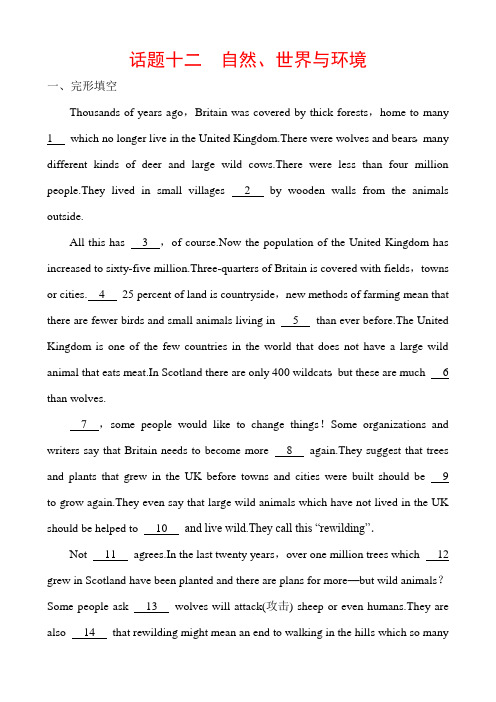
话题十二自然、世界与环境一、完形填空Thousands of years ago,Britain was covered by thick forests,home to many 1 which no longer live in the United Kingdom.There were wolves and bears,many different kinds of deer and large wild cows.There were less than four million people.They lived in small villages 2 by wooden walls from the animals outside.All this has 3 ,of course.Now the population of the United Kingdom has increased to sixty-five million.Three-quarters of Britain is covered with fields,towns or cities. 4 25 percent of land is countryside,new methods of farming mean that there are fewer birds and small animals living in 5 than ever before.The United Kingdom is one of the few countries in the world that does not have a large wild animal that eats meat.In Scotland there are only 400 wildcats,but these are much 6 than wolves.7 ,some people would like to change things!Some organizations and writers say that Britain needs to become more 8 again.They suggest that trees and plants that grew in the UK before towns and cities were built should be 9 to grow again.They even say that large wild animals which have not lived in the UK should be helped to 10 and live wild.They call this “rewilding”.Not 11 agrees.In the last twenty years,over one million trees which 12 grew in Scotland have been planted and there are plans for more—but wild animals?Some people ask 13 wolves will attack(攻击) sheep or even humans.They are also 14 that rewilding might mean an end to walking in the hills which so manypeople enjoy.So far there are no wolves or bears in Britain's forests—but soon there 15 be!( )1.A.birds B.animals C.insects D.people( )2.A.built B.divided C.carried D.protected( )3.A.changed B.dropped C.progressed D.disappeared( )4.A.Because B.When C.Unless D.Although( )5.A.cities B.fields C.zoos D.yards( )6.A.bigger B.smaller C.older D.younger( )7.A.Also B.First C.However D.Instead( )8.A.natural B.beautiful C.popular D.comfortable( )9.A.forced B.invited C.allowed D.refused( )10.A.grow B.return C.create D.improve( )11.A.everybody B.somebodyC.anybody D.nobody( )12.A.at first B.at lastC.later on D.as well( )13.A.that B.if C.how D.when( )14.A.glad B.amazed C.scared D.angry( )15.A.must B.should C.might D.can二、阅读理解A(2019·衢州)The world has a plastic problem.And not just with bottles.Straws(吸管),toothbrushes,toys—all kinds of plastics are placed in landfills.There are 5 billiontons of plastic waste in the ndfills have a large part of it.By 2050,they could have 13 billion tons.Much of plastic rubbish finds its way into the ocean.Scientists say 165 million tons of plastic pieces are floating around out there.And most plastic won't disappear itself.It will remain in the ocean forever.Whales get caught in plastic fishing nets.Birds die because of eating plastic straws and bottle caps.It endangers ocean life.Plastic rubbish even ends up in the food we eat.Governments are realizing that recycling may not be enough.They are taking more actions.Though it is hard work,it is still a solvable problem.In Britain,people are not allowed to use plastic bags except in hospitals.Scotland and several coastal cities in the US stop people from using plastic straws as well.The US alone throws away some 500 million plastic straws a day.That's enough to circle the Earth twice.“Saying no to a plastic straw is an easy way to make a big difference,” Diana Lofflin who started said.“Do we really want to pass on to our children a world harmed by plastic?”People have found some tasty ways to reduce waste.A company in India made the first-ever spoon that people can eat.You don't have to eat the spoon.You can throw it away.It decomposes(分解) in just a few days.David Edwards,a scientist at Harvard University,designed an eatable bag which can protect the food or drink inside.It is a delicious replacement for plastic ones.( )1.According to the writer,birds die because they .A.eat bottle caps and strawsB.get caught in fishing netsC.feed on ocean animalsD.have the spoons in India( )2.The underlined word “endangers” in Paragraph 2 probably means .A.brings B.losesC.harms D.saves( )3.The purpose of the passage is mainly to .A.introduce some ways to recycle wasteB.tell readers about the problem with plasticC.compare air pollution and plastic pollutionD.describe how the US is reducing plastic waste( )4.From the passage,we can tell that the plastic problem .A.is too big for people to solveB.can be solved by recycling aloneC.can be solved,but it won't be easyD.will have to be solved by future scientistsB(2019·台州椒江模拟)Without the Nile River,the great civilization(文明) of Ancient Egypt may never have appeared.Until about nine thousand years ago,all of Egypt was under the water.When the climate began to turn dry,tribes(部落) of people began to move from North Africa to land near the ter small villages appeared along the banks of the Nile River.Each village had a leader who ruled the village and would battle with other villages.Around 3300 BC,all these tribes came together to form the civilizationof Ancient Egypt.One main reason Ancient Egypt was built around the Nile River was its yearly flood(洪水).It made farming possible for people there.The flood was so important that leaders would even perform religious ceremonies.And these ceremonies were believed to cause the river to rise and flood.The flood made the land very good for growing crops such as wheat and ually farmers began to plant these crops in November right after the flood.Because of the Nile,they were usually able to grow a lot of crops.If the grain was not used,it would be stored for later use.Historians believe that this is one of the main reasons that Ancient Egypt became a very powerful and wealthy nation.The Nile River also served as an important means of transportation.Ancient Egypt did not have the wheel.So there were no wagons or carts at that time.However,Ancient Egyptians learned to build boats so that when the Nile flooded they could use the river as a main road throughout Egypt.It is said that without the Nile River,there would be no pyramids(金字塔).This is because historians think that the huge stones were carried on the river by boat.From this,people would easily understand why the pyramids sit close to the river on its west bank.( )5.From the article,we know people began to move to the Nile River .A.nine thousand years agoB.after the weather became dryC.when the river began to floodD.after the first crops began to grow( )6.The flood in the Nile River influenced farming by .A.making the land rich for growing cropsB.causing the crops to grow earlier in the yearC.allowing farmers to plant crops every few yearsD.covering all the crops with water except wheat and barley( )7.In Ancient Egypt,were an important means of transportation. A.boats B.wagonsC.cows D.carts( )8.The best title for the article can probably be .A.The Ancient Egyptian CivilizationB.The Formation of Ancient EgyptC.The Importance of the Nile River in Ancient EgyptD.The Farming in Ancient Egyptian Civilization三、词汇运用Do you know Australia?Australia is the largest 1 (岛) in the world.It is a little smaller than China.It is in the south of the earth.Australia is big,but its population is not large.The population of Australia is nearly as large as that of Shanghai.The government has made enough laws to 2 (与……作斗争) pollution.The cities in Australia have got little air or water pollution.The sky is 3 (蓝色的) and the water is clean.You can clearly see fish swimming in the rivers.Plants grow very well.Last month we visited Perth,the biggest city in 4 (西方的) Australia,and went to a wild flowers' exhibition.There we saw a large number of wild flowers we had never seen before.We had a wonderful time.Perth is famous for its beautiful wild flowers.In every 5 (春天) Perth has the wild flowers' exhibition.After visiting Perth,we 6 (度过) the day in the countryside.We sat down and had a rest near a path at the foot of a hill.It was 7 (安静的) and we enjoyed ourselves.Suddenly we 8 (听见) bells ringing at the top of the hill.What we saw made us pick up all our things and run back to the car as 9 (快地) as we could.There were about three hundred sheep coming towards us down the path.Australia is famous for its sheep and kangaroos.After a short drive from any town,you will find yourself in the middle of white sheep.Sheep,sheep,10 (到处) are sheep.1.________ 2.________ 3.________ 4.________5.________ 6.________7.________8.________9.________10.________四、语法填空Cycads(苏铁) grow in warm places.They are tall and greenall year round.Their 1 (leaf) grow on the top and flowersseldom come out.Some have bright orange fruits.They usuallyneed hundreds of years 2 (grow) into adult plants.Cycads 3 (face) problems now.In South Africa,the situation of cycads is getting terrible,but this has drawn little attention from the public.“In fact,there are 38 kinds of cycads in South Africa. 4 them,2 kinds have disappeared since 2003and 25 kinds are in great danger,” said a gardener.“Do you know what the 5 (lonely) plant is in the world?It is Wood's Cycad.Someone found it in a forest in 1895.It is the only one of 6 (it) kind.”So what causes cycads to be in danger?Surprisingly,the danger is from the people 7 love them most.These slow-growing adult cycads even sell for tens of thousands of dollars each.As time goes by,they have become 8 symbol of wealth and position in society.This makes cycad lovers want to own more.Cycad lovers buy and plant them in their private gardens.As a result,nearly all these cycads die because the living conditions have changed.9 (recent),South African government has taken some actions to protect cycads from 10 (steal) and traded.At the same time,people around the world should also work together to protect the plants.1.________ 2.________ 3.________ 4.________5.________ 6.________7.________8.________9.________10.________五、任务型阅读阅读下面短文,根据文中信息完成一张海报,每空不超过三个词。
- 1、下载文档前请自行甄别文档内容的完整性,平台不提供额外的编辑、内容补充、找答案等附加服务。
- 2、"仅部分预览"的文档,不可在线预览部分如存在完整性等问题,可反馈申请退款(可完整预览的文档不适用该条件!)。
- 3、如文档侵犯您的权益,请联系客服反馈,我们会尽快为您处理(人工客服工作时间:9:00-18:30)。
分类默写(十一) 自然、世界与环境1.动物(n.)生命(n.)宠物(n.)动物(n.)蚂蚁(n.)熊猫(n.)老虎(n.)狮子(n.)大象(n.)狐狸(n.)长颈鹿(n.)袋鼠(n.)熊(n.)猴子(n.)鲨鱼(n.)蛇(n.)蜜蜂(n.)老鼠(n.)鸟(n.)奶牛(n.)狗(n.)母鸡(n.)鸭子(n.)猫(n.)绵羊(n.)猪(n.)马(n.)机翼;翅膀2.植物(n.)树(n.)植物(n.)枝条;棍(n.)水果(n.)苹果(n.)香蕉(n.)梨(n.)橘子(n.)葡萄(n.)柠檬(n.)草(n.)豆(n.)竹子(n.)花(n.)玫瑰(n.)树叶3.自然(n.)季节(n.)春季;春天(n.)夏季;夏天(n.)秋季;秋天(n.)冬季;冬天(n.)地震(v.)着火(n.)火灾(n.)自然(adj.)自然的(n.)(热带)丛林(n.)高山(n.)小山;山丘;斜坡(n.)岛(n.)海岸(n.)岩石(n.)地面(n.)陆地;土地(n.)江;河;河流(n.)湖(n.)池塘(n.)河岸(n.)石头太平洋(n.)海洋(n.)大海(n.)波浪(n.)沙滩(n.)冰(n.)沙子(n.)陆架;架子(n.)面积;地域;区域;范围;领域(n.)洞;坑(n.)煤(n.)油,石油4.太空(n.)天空(n.)空气;大气(n.)云(n.)月球;月亮(n.)星星;恒星(n.)地球;大地;土(n.)行星(n.)空间(n.)拉力;牵引力;拉(n.)通讯;交流(adj.)可移动的(n.)模型(adj.)现代的5.国家与城市(n.)人口(n.)世界(n.)国家(adj.)外国的(n.)亚洲(adj.)亚洲的;亚洲人的(n.)亚洲人(n.)非洲(n.)欧洲(adj.)欧洲的(n.)欧洲人(n.)中国(adj.)中国的;中国人的;汉语的(n.)美国;美洲(adj.)美国的;美国人的(n.)日本(adj.)日本的;日本人的;日语的(n.)澳洲;澳大利亚(adj.)澳洲的;澳大利亚的(n.)英国(n.)英国人(adj.)英国的(adj.)英格兰的;英语的(n.)伦敦(n.)德国人(n.)德国(n.)法国(n.)法语(adj.)法国(人)的;法语的(n.)俄罗斯(adj.)俄国人的;俄语的(n.)加拿大(adj.)加拿大的;加拿大人的(n.)印度(adj.)(美洲)印第安人的;印度人的(n.)意大利(n.)国家;(美国的)州(n.)城市(n.)首都(adj.)国际的(adj.)国家的;民族的(n.)种族;民族6.环境(n.)环境(adj.)干净的;清洁的(adj.)晴朗的,清晰的(adj.)脏的(adj.)整洁的(v.)乱丢垃圾(n.)凌乱(adj.)凌乱的(n.)噪音(adj.)喧闹的;嘈杂的(n.)污染(v.)再回收;再利用(n.)垃圾;废物(vt.)破坏;毁灭(n.&vt.)浪费(n.)安宁;和平【参考答案】life (复lives) (n.)生命pet (n.)宠物animal (n.)动物ant (n.)蚂蚁panda (n.)熊猫tiger (n.)老虎lion (n.)狮子elephant (n.)大象fox (n.)狐狸giraffe (n.)长颈鹿kangaroo (n.)袋鼠bear (n.)熊monkey (n.)猴子shark (n.)鲨鱼snake (n.)蛇bee (n.)蜜蜂mouse (复mice) (n.)老鼠bird (n.)鸟cow (n.)奶牛dog (n.)狗hen (n.)母鸡duck (n.)鸭子cat (n.)猫sheep (复sheep) (n.)绵羊pig (n.)猪horse (n.)马rabbit (n.)兔子tail (n.)尾巴wing (n.)机翼;翅膀tree (n.)树plant (n.)植物stick (n.)枝条;棍fruit (n.)水果apple (n.)苹果banana (n.)香蕉pear (n.)梨orange (n.)橘子grape (n.)葡萄lemon (n.)柠檬grass (n.)草bean (n.)豆bamboo (n.)竹子flower (n.)花rose (n.)玫瑰leaf (复leaves)(n.)树叶3.自然season (n.)季节spring (n.)春季;春天summer (n.)夏季;夏天autumn (n.)秋季;秋天winter (n.)冬季;冬天earthquake (n.)地震burn (v.)着火fire (n.)火灾nature (n.)自然natural (adj.)自然的forest (n.)森林wood (n.)树林mountain (n.)高山hill (n.)小山;山丘;斜坡island (n.)岛coast (n.)海岸rock (n.)岩石ground (n.)地面land (n.)陆地;土地river (n.)江;河;河流lake (n.)湖pool (n.)池塘bank (n.)河岸stone (n.)石头the Pacific Ocean太平洋ocean (n.)海洋sea (n.)大海wave (n.)波浪beach (n.)沙滩ice (n.)冰sand (n.)沙子shelf (复shelves) (n.)陆架;架子area (n.)面积;地域;区域;范围;领域hole (n.)洞;坑coal (n.)煤oil (n.)油,石油4.太空sky (n.)天空air (n.)空气;大气cloud (n.)云sun (n.)太阳star (n.)星星;恒星earth (n.)地球;大地;土planet (n.)行星space (n.)空间pull (n.)拉力;牵引力;拉communication (n.)通讯;交流mobile (adj.)可移动的model (n.)模型modern (adj.)现代的5.国家与城市population (n.)人口world (n.)世界country (n.)国家foreign (adj.)外国的Asia (n.)亚洲Asian (adj.)亚洲的;亚洲人的(n.)亚洲人Africa (n.)非洲Europe (n.)欧洲European (adj.)欧洲的(n.)欧洲人China (n.)中国Chinese (adj.)中国的;中国人的;汉语的America (n.)美国;美洲American (adj.)美国的;美国人的Japan (n.)日本Japanese (adj.)日本的;日本人的;日语的Australia (n.)澳洲;澳大利亚Australian (adj.)澳洲的;澳大利亚的Britain (n.)英国British (n.)英国人(adj.)英国的English (adj.)英格兰的;英语的London (n.)伦敦German (n.)德国人Germany (n.)德国France (n.)法国French (n.)法语(adj.)法国(人)的;法语的Russia (n.)俄罗斯Russian (adj.)俄国人的;俄语的Canada (n.)加拿大Canadian (adj.)加拿大的;加拿大人的India (n.)印度Indian (adj.)(美洲)印第安人的;印度人的Italy (n.)意大利state (n.)国家;(美国的)州city (n.)城市capital (n.)首都international (adj.)国际的national (adj.)国家的;民族的race (n.)种族;民族6.环境environment (n.)环境clean (adj.)干净的;清洁的clear (adj.)晴朗的,清晰的dirty (adj.)脏的tidy (adj.)整洁的litter (v.)乱丢垃圾mess (n.)凌乱messy (adj.)凌乱的noise (n.)噪音noisy (adj.)喧闹的;嘈杂的pollute (vt.)污染pollution (n.)污染recycle (v.)再回收;再利用rubbish (n.)垃圾;废物destroy (vt.)破坏;毁灭waste (n.&vt.)浪费peace (n.)安宁;和平。
